#obviously it depends on how the themes are treated & how the work is executed
Explore tagged Tumblr posts
Text
It really does feel like a lot of people are unable to (or don't want to) make the distinction between "nasty themes because we find it fun" and "nasty themes cause we have shit to say". Most books considered disturbing will fall into either category. "Like Porno for Psychos" falls into the first one perfectly, it has no purpose other than to entertain you for however many hours you read it, and the violence in it is just violence. I have not read many if any books that fall into the second, but I'm certain that many, many classics do and they are revered because they explore the topics well, but there is this weird attitude where the only books allowed to have "disturbing" themes are either classics or nasty for the sake of being nasty. I'm not saying we've gotten the next "Crime & Punishment", or "Perfume", or "Lolita" in recent years, because I can't possibly know that, but that people have become quick to spit at and step on anything they deem too extreme or too cruel and ignore any possible ideas the book may be trying to convey, whether they are "good" ideas or not, or whether it succeds at conveying them or not. It just feels like you can't enjoy this kind of fiction without being looked at as "weird" by most people, and I am not saying that having "darker" themes makes one work deeper or better than one that doesn't, but that people in general need to become more comfortable with being uncomfortable. I am so sleepy. Can u tell.
#diary#much to think about#it doesn't mean you have to go out and trigger yourself on purpose or that anyone not willing to read something they deem extreme is weak.#it means that u have to become at peace with the fact that works that make u uncomfortable WILL and do exist and that they are not#inherently bad#obviously it depends on how the themes are treated & how the work is executed#but that's the thing: you don't know that#not necessarily have to read it to find out. reviews are available for a reason#but it is important (when you don't read it yourself) to look at both negative & positive feviews#reviews ***#damn I really am sleepy 💤💤💤💤💤
7 notes
·
View notes
Note
Do u believe that Jaime might kill Cersei and then himself at the end of the series? I saw other page theorizing about him killing himself as a final act or something like that…
i think about jaime and suicide a lot bc i do think it is a permeating theme with him in many ways, and he does do a lot of passive suicidal ideation. he is one of the characters who does not fear death really and is reckless in a way that it is clear that part of him seems drawn to it because of his existential dread. idk bc the thing is that i do think that “what else can i do, but die?” passage indicates the opposite of an ending with suicide specifically, and i think there are themes relevant to him here that i think are more likely to be followed through rather than be tragically rejected:
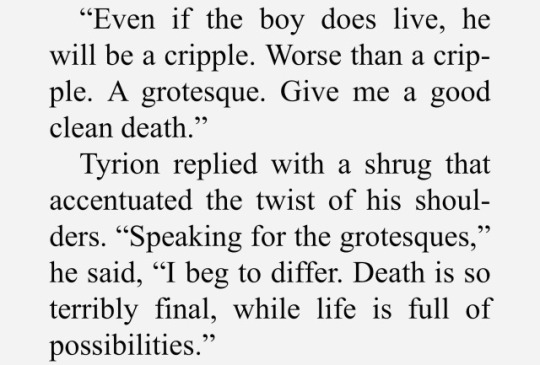

nonetheless, theres a certain part of me that is morbidly drawn to him succumbing to despair anyway. like if he dies with valonqar, i think thats the only way i would actually like it. i was never someone that felt particularly moved by the “poetry” or “irony” of dying together because i always thought all of that is much richer if it is treated as desperate self affirming delusion that is bound to collapse. and we already see jaime reject dying with her once. there is a visible degree of acceptance of their fates not being entwined that is not feigned bc he did actually leave her to her fate and no longer feels the obligation to die with her, pretty clearly juxtaposed with his mindset in asos where he revolves his life around her “needing” him, and ofc cersei’s own desperate narrative rn. and i think george writing it so they can die exactly at the same time doesnt just feel unrealistic but also would hurt the weight of the scene to me because it would give me no aftermath. a wall falls on them both? valonqar doesnt even happen then. jaime killing cersei and then a wall falls on him or some shit? whats the point? double suicide? where is the ‘betrayal’ and irony and subversion of the jc dynamic’s narrative? cersei’s mindset is proven right. cersei kills him? idk if that works with cersei’s tragedy/betrayal/shock + how would she? he’s injured from something else and makes sure to bring down cersei with him? ig, still feel eh about it. if it happens, i wouldnt feel that much about anything thats not an actual suicide after a murder. and even then, it would make more sense for jaime to attempt suicide by rushing into the nearest battle/suicide mission based on his established characterization. that is the type of act that would be in character rather than just falling on a sword then and there ig. u can argue that the choice itself of him going back can be framed as a suicide attempt where he wants to go down with a sinking ship bc he thinks thats what he deserves, and ofc depending on when this happens the city might be beyond saving already, but still, the execution and circumstances matter to me. i also obviously dont want it framed as him being unable to live without cersei. i find that reductive of his character and boring on top of kind of incongruent bc he already made that choice of key separation once. he already proved himself capable of treating their lives as not entwined. i would only like suicide if it was about a complicated and ingrained sense of failure over not being able to triumph over reckoning with the world and the self (this is what makes the light go out in the weirwood dream too. cersei leaving is not where it ends), esp bc i assume the whole thing is playing on history repeating itself in the most ironic and dark way imaginable. ofc a bigger part of me wants triumph over that this time and for that flaming sword that he gave brienne to still burn and provide light in “his darkness”, replacing cersei’s torch that she takes with her in the dream as she joins tywin and joffrey and the lannister ancestors and leaves jaime in “the dark”, to represent some deeper purpose also embodied by brienne that allows him to continue past this point (the flames will burn as long as you live when they die so must you), and i also think it works better in a lot of ways. i have talked about widow’s wail currently being in the red keep, the twin swords set up, twftd foreshadowing, how i interpret the prophecies in the weirwood dream and how it works with the past and future etc, even how it all comes together thematically when it concerns knighthood and the cynicism/idealism synthesis. but still, a part of me is attracted to that kind of painful tragedy. im fairly open to a lot of things in general if they are not halfbaked and incongruent and dont make me feel empty in a bad way on top of being unsatisfied. but yeah, when thinking about the narrative as a whole, idk how it could work in a way that id like based on all that i have read.
to me, theres too much cost in terms of set ups, unless it happens at the very end of the story ig. but how would that work logistically? and when and how would he acquire widow’s wail? that sword’s a chekhovs gun for twftd that i think jaime has the most foreshadowing and set up with. what else would he do at the red keep? why put him there again when this part of the story could be wrapped up? like theres a certain order of events that seems to work and make the established pieces fall together much better in my head, but ofc i could be wrong.
26 notes
·
View notes
Text
So, in almost all cases, fiction depends on at least some minimal level of connection to realism. Unless something is explicitly written as a non-sequitur with no structure (and even then, some will find meaning in it if only by cross-referencing to real-world logic), we tend to expect things to be like real life unless we're given a good reason to think otherwise.
So, in Game of Thrones, we expect and accept dragons and magic existing because those are mainstays of the genre. And we expect some characters to declare life-risking loyalty to monarchs, even though almost nobody nowadays could really relate to that, because we understand the historical context the show is roughly based on, we expect it of the genre, and it 'makes sense' for the characters.
However, when Daenerys happily rides a dragon past a person she knows has it out for her and would try to kill her dragon, and her dragon dies, we get annoyed. We can accept dragons existing, but we just don't buy Daenerys psychologically acting that way: she's smart and ambitious and cautious, and most certainly would not just forget about a major threat so easily. People in the real world with her qualities and history wouldn't act like that: it isn't 'realistic'.
With that being said, writers are not omniscient. They carry into their works a countless array of assumptions about the way the world works. And so, even when they weren't deliberately intending for a story to send a particular message, we can still interrogate the array of 'common sense' presumptions that went into writing it: the stuff they thought was so obviously 'realistic', they probably didn't even think about it.
Take a very misogynistic writer who believes that it is normal and good for a husband to beat his wife when she misbehaves. And let's say this opinion isn't that far from the mainstream; or at the least, it's not a viewpoint that we often draw attention to. They would probably think nothing of having a heroic and likeable character treating his wife like that, the incident would probably be treated in a pretty perfunctory and undramatic sort of way (as it is, in the writer's imagination, a perfectly common and unexceptional occurrence), and there wouldn't be shown or implied to be any negative consequences for the wife.
This is all the sort of thing we think of when we talk about framing, and particularly around 'romanticising' behaviours. By examining the way a specific action (or theme or character or so forth) is treated - comically, dramatically, or neutrally? How are the shots staged; who gets any emotional close-ups? Who are our viewpoint characters? When does this scene occur, and how is it edited it; what comes before and after? - we can examine how a writer may have intended an action to be perceived.
Of course, this comes with a lot of caveats. This is all very subjective, not a checklist scenario: for example, a protagonist or even hero character performing an action is not necessarily always romanticised; characters can have flaws! Also, writers(/producers/directors/whoever) can just be... bad at their jobs? The clearest marker or failed art is in failing to communicate what was intended; maybe the creator of the scene described above thought it was 'obvious' that the hero beating his wife was bad, and mishandled the execution.
Additionally, everything has to be viewed in context. Sometimes, the bigger picture can completely change an interpretation of a scene. For example, the main characters of the What We Do In The Shadows TV show routinely act in vile ways typically reserved for horrific villains, but that's because the show is a dark comedy, and in this case, the show avoids romanticising them (among other ways) by making them giant fucking idiotic losers.
It's also worth noting that a lot of these analyses work far better on a societal level, much like BMI being intended to work with overall populations rather than individuals. If particular actions tend to be portrayed in certain ways, it says something about what we tend to think of as 'normal' for those actions. Looking at things that way is almost always most helpful than singling in on specific creators and holding them individually responsible for widespread, structural oppressions.
tl;dr: writers come into works with assumptions about reality, and through analysing fiction we can try to discern what they (or, ideally, what the society they're writing in) believe about the world.
3 notes
·
View notes
Text
“I’m loyal, that’s my whole thing.” - Scorpia, Season 4 Episode 6, Princess Scorpia
“Everything they taught us in the Horde about loyalty is meaningless” - Lonnie, Season 4 Episode 5, Protocol
Rewatching Season 4, I just finished Princess Scorpia. This is an episode that has always stuck with me, especially the A plot of Scorpia realizing how badly Catra has treated her and everyone else and deciding to leave. One thing I’ve been thinking about since I finished the series, though, is what this episode is telling us on a larger level. Looking beyond the character arcs and more at this show’s larger themes and message. Because this show is very much a show that says things, made by people who believe them. That earnestness and depth is one reason I keep coming back to it.

In the pull-quote above, and throughout the episode and before it, Scorpia defines herself in terms of loyalty. It is her identity - as she says, that’s what Scorpions do, they’re loyal. Her actions for three and a half seasons bear this out. When she first shows up, she tries to position herself as Catra’s new best friend, the one who won’t leave her and will stick by her no matter what. And that’s what she does, until this episode. She sticks by Catra through Catra’s increasingly villainous plots and erratic behavior. But she doesn’t just stick around. Until the portal, she barely contradicts Catra, and even afterwards, does so only furtively and immediately backs away as soon as Catra pushes back. For more than a year of show time, Scorpia has not just stood by Catra, or supported her, she’s actively assisted her in her most villainous and destructive acts. Scorpia is fighting by Catra’s side, eagerly carrying out her orders, and doing her utmost to see that Catra succeeds. But her loyalty goes beyond this practical help. Because for all that Catra loudly declares that she doesn’t need a new best friend, she consistently seeks out connection throughout the show, even when she’s at her most isolated in season 4. She needs moral support, and connection, and to know that she isn’t alone. Scorpia provides that, and keeps Catra going. Though Scropia isn’t initiating Catra’s various misdeeds, she’s assisting and supporting Catra throughout. On a personal, psychological level, the only word that seems adequate for this is ‘ennabling’ - Scorpia, sweet as she is, is Catra’s enabler. We see in the next few episodes what happens when Catra doesn’t have Scorpia’s support - she breaks down, and realizes that her actions really do have consequences, and that the affection she took for granted for so many years is something she can’t live without. But as long as Scorpia’s still around, Catra can’t make that realization.
Now I’m not going to say that Scorpia is morally culpable for Catra’s own actions. She’s not. Catra is solely responsible for her various betrayals, manipulations, violent outbursts and assorted murder attempts against...most of the rest of the cast (though being raised by Shadow Weaver sure as shit is a mitigating factor). But while Catra is obviously being a bad friend to Scorpia throughout, Scorpia isn’t actually being as supportive or helpful to Catra as she thinks, because Catra doesn’t actually need unconditional support, she needs people to be honest with her and express to her how she’s hurting them. She needs people who will stand up for themselves just as she needs to take responsibility for her own actions. This is part of why she and Adora have such a healthy dynamic in season 5 - Adora doesn’t take her crap, and Catra takes responsibility for her crap.
However, Scorpia -is- responsible for her own actions. And as I said above, she’s been with Catra every step of the way as Catra has attacked just about everyone and made war on Etheria. On a larger, political level, Scorpia is a willing participant in upholding the Horde’s oppressive system, and executing a war of aggression and colonization against innocent people. Speaking of colonization, perversely, she’s loyal to the very organization that dispossessed her and literally stole her birthright, then discarded it like a useless trinket when it was no longer useful to them. No one ever suggests ‘why don’t we let Scorpia connect with ~her runestone~’ until Glimmer does (and Glimmer’s motivations and arguments aren’t exactly forthright). Scorpia’s loyalty makes her an accomplice in her own oppression (like a bunch of the themes in this show there’s some interesting post-colonial stuff that the show doesn’t fully explore, probably because Noelle and the crew felt self-conscious about telling a post colonial story, or just didn’t know where to go with it). Interestingly, Scorpia’s loyalty to the Horde here parallels her loyalty to Catra, which has made her completely disregard her own wellbeing, which is the most obvious take away from the episode.
But I would argue that everything above shows that for Scorpia loyalty has been a way of avoiding developing her own moral compass. Scorpia repeatedly shoves aside questions of right or wrong in favor of being loyal to her friends and to the Horde. Loyalty has made Scorpia not only willing to accept her own mistreatment, but to willingly mistreat others, and to keep herself from asking any hard questions about what she’s doing or why. This is despite the fact that Scorpia is, by inclination, an incredibly gentle, kind and compassionate person. She’s willing to silence the best parts of her nature out of loyalty to Catra and the Horde. In the end, she also commits acts of violence and perpetuates the oppression of Etheria. And this is so insightful, because we see this sort of thing in our world all the time. So many oppressive institutions depend upon the loyalty of their members to keep them ‘just following orders’; so many abusive systems depend upon loyalty to stifle dissent and silence potential whistleblowers before they even speak. We see this in some of the most oppressive institutions and the worst scandals in our own society, and looking back through human history we see it in some of our nation’s and our species' most infamous crimes.
And when we look at the Horde as a system that Hordak has built in imitation of his elder brother’s empire, we see just how central loyalty is an ethos. Hordak himself is motivated entirely by loyalty to Prime - being a former clone, he spends the entire series not fully capable of accepting himself as an autonomous being (even when he acts like one and enjoys it, there’s some fucked up religious shit there that I won’t get into). He seems to have instilled this in his followers. The Horde Trio, Catra and Scorpia all hold loyalty as one of their highest values. Catra clings to it as her biggest accusation against Adora - that she was disloyal, as expressed in Catra’s perception that Adora broke her promise and abandoned her. Loyalty keeps the Horde Trio together and fighting for the Horde, and Scorpia with Catra. I think we can read between the lines and say the Horde runs on loyalty (as well as fear) and this is a very insightful portrayal of oppressive military and paramilitary institutions like armies of conquest and occupation and other instruments of state violence.
There’s another, related way of looking at how a sole reliance on loyalty as a moral framework has stunted Scorpia’s moral growth, and I think that brings together both the ways that it makes Scorpia willing to accept her mistreatment and participate in the mistreatment of others. Namely, loyalty in the Horde style isn’t just sticking with someone or something, but subsuming your own will into theirs. Following orders. Supporting your friend in what they do no matter what. Whatever you call it, it’s about turning off your own self - your self preservation, your self respect, your conscience, whatever other things you value - and just going along with what the person or institution you are loyal to wants you to do. And this is where Horde loyalty goes full circle, back to its origin - Horde Prime, the narcissistic self-made god who wishes to control or destroy everything that is not himself. Loyalty as Hordak conceived of it and as the Horde believes in it is a reflection of Prime's absolute control over all his domain.
In a way, self-determination is one of this show’s highest values (together with love). It’s at the heart of Adora’s 5-season, 3 year struggle to become her own woman and her own hero as she shrugs off one imposed destiny and then another and finally embraces what she wants. In a more negative form, it’s at the heart of Catra’s arc, as she finally accepts responsibility for her own actions and their consequences and starts working to make a world that she actually wants to live in, as well as admit to herself that what she really wants is love. And I could go on. This self-determination is existentially, obviously threatened by Prime chipping people, but it is also stunted by horde-style loyalty that demands unquestioning support and obedience.

Both the Horde Trio and Scorpia reject the Horde’s ideal of loyalty and walk away, but I think it’s interesting how they do it. Neither rejects loyalty entirely (not on the way Adora does) - the Trio, realistically, remain loyal to each other and simply walk away and walk out of the war (this might save their lives), joining the other disillusioned cynics in the Crimson Wastes. They reject loyalty to the horde and embrace a more supportive and respectful form of loyalty to each other. Scorpia leaves, but she actually comes to her crisis and makes her decision out of loyalty, and because it’s clear that her loyalty isn’t returned. The immediate situation - loyalty to Emily and Entrapta’s memory on one hand and Catra’s orders on the others - creates the conflict between loyalties that forces Scorpia to actually make her own choice rather than deferring to Catra. But she also reflects how Catra betrayed her loyalty to Entrapta, and thus how all of her friends’ loyalty to Catra is not returned.This is another point about horde-style loyalty - it’s one way - Hordak or Catra will demand your loyalty, but they feel no obligation to return it, which reflects Prime’s view of every other being in the universe as disposable. It’s only when she’s with the Princesses that Scorpia starts to find a new moral center, though sticking up for and protecting her friends remains important to her. In neither case, though, are these kinds of loyalty coming at the cost of either the Trio or Scorpia’s autonomy or ability to make moral choices of their own. In the very next episode, she says she wants to 'be A good friend' which is how the Princesses typically describe sticking together, which is a much more active and holistic concept than 'loyalty'. Scorpia confesses that she doesn't even know how, but she wants to learn and thinks the princesses can teach her.
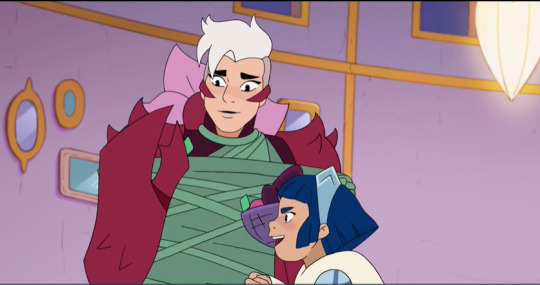
There's another interesting counterexample to Horde Loyalty. Adora repeatedly breaks with the people around her to do what is right. First she leaves the Horde, then walks away from Catra by stages when it is clear that Catra is going to continue to harm other people and Etheria. Then she walks away from Glimmer, defies Light Hope and breaks loyalty with her supposed destiny and purposes as well as loyalty to the homelans she has never known. By season 5, Adora is loyal only to herself and the people she cares about, but she isn't constraining her will to anyone else's. For all that she seems like a rule follower Adora has a rebellious streak a mile wide, and she will do what is right, no matter what. This is what allows her to save the universe 3 times.
So the show’s argument is that loyalty is not a good moral framework to base all of our actions around. I don’t think it goes so far as saying that loyalty has no place in our ethics (being a good friend, which is such a huge part of the show, certainly includes loyalty, especially sticking with people when the going gets tough), but the show stresses time and again that being loyal to something or someone shouldn’t make you disregard yourself and what you think is right. Because it’s only by living out our own values and taking responsibility for our own actions that we can come into our own as moral beings. Moreover, if we insist on maintaining loyalty to institutions that oppress us and others, we can’t dismantle the systems of oppression that are holding us and other people down. (Yes, this is a pretty radical message, but I suspect that Noelle is some kind of anarchist? Anyway, it’s a thing.)
Okay, so that’s what I, a 35 year old, get from this kids show. I think it’s also worth pointing out that this lesson applies to younger viewers too, in their most immediate lives. Younger viewers will have had friends who didn’t treat them well, or might not have treated other people well, and who might have pressured them into participating in the mistreatment of others (this is kind of how bullying works a lot of the time). I think it’s important that younger viewers see how being a good friend never means disrespecting yourself or other people and it means a lot to me that She-Ra shows this in such a nuanced and realistic way.
#she ra#she ra spoilers#spop#she ra netflix#she ra and the princesses of power#meta#analysis#scorpia
167 notes
·
View notes
Text
The Witcher: The Games vs The Books
Coming to the fandom this late, I can only assume the relationship between the Witcher games and the original novels has been long since talked to death by others. But I'm far too fascinated by the whole glorious mess that is this canon not to want to get down some of my own thoughts about how it all fits together.
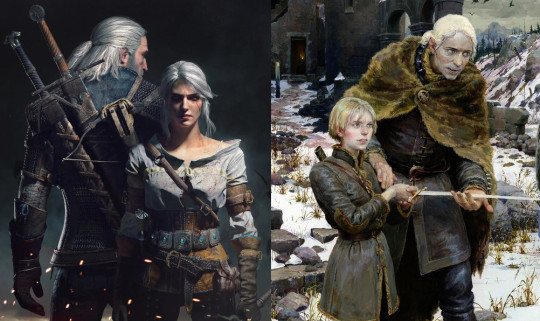
See, on the one hand, the games (Witcher 3 especially) are arguably only too dependent on the novels to stand alone. They do a wonderful job of picking up a number of unresolved plot points the books left hanging, and a woeful job of explaining so much a player coming in cold would really like to know – Ciri's history with Geralt, Yennefer, her powers and the Wild Hunt itself just to begin with. This is an issue that only increases as the games go along: cliche as Geralt's amnesia may be, it's used to good effect to introduce the world to the player in the first game. By the third, Geralt has all his old memories back and two extra games worth of new experience, and good lord is it all alienating to the newcomer.
On the other hand, so much about the games (again, the third especially) contradicts the novels in painfully irreconcilable ways. That wouldn't necessarily bother me – adaptations are allowed to rework and reinvent, stories can and should evolve in the retelling – except, well, see point one above. So you're bound to come out of the games with a lot of unanswered questions if you haven't read the books, and just as many if you have.
Spoilers to follow, of course, for both the books and the games.
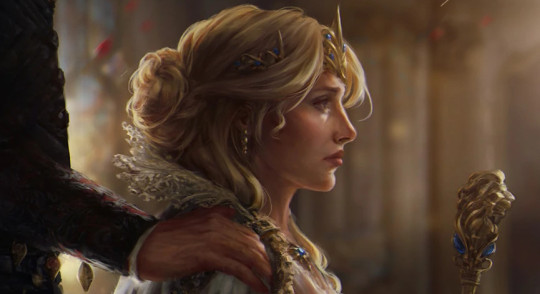
Here's one of the big ones: just how did the world – Ciri included – discover that one of her long-presumed-dead parents was actually alive and well and now ruling the entire empire of Nilfgaard? Fucked if I know. Neither the games or the novels have any explanation. In the novels, in fact, the world at large believes Ciri is married to the emperor of Nilfgaard. Naturally, this 'Cirilla' is a fake, but the scandal were the full truth ever revealed would redefine Emhyr's reign. Yet somehow, in the games, everyone seems to know he's Ciri's father, and that whole awkward incest angle is never mentioned. Continuity has been tweaked pretty significantly, and it's left to the player to guess how. If that wasn’t bad enough, the games apparently still included a Gwent card of the fake!Cirilla (artwork above) just to ensure maximum confusion.
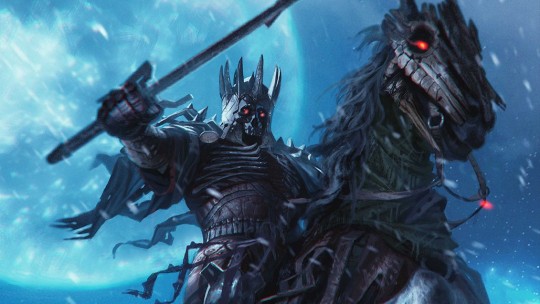
Before I get too sidetracked with all that stuff that doesn’t add up though, there really is a lot to be said for what does work about how the games expand on the plot of the novels. The Wild Hunt itself is the big one. The spectral cavalcade appears several times through the novels and hunts Ciri across multiple worlds in the final book before apparently losing her trail and vanishing to make way for the 'real' big bad, never to be mentioned again. While TW3 left me pretty underwhelmed by the revelation that the spectral Wild Hunt were just a bunch of dark elves in skull armor, the books had introduced the Hunt and let us spend some time on the dark elves' world before we get the reveal that the two may be one and the same. So for all the ranting I could do about missed opportunities regarding the Wild Hunt, they're the natural candidate for the games to pick up on as their new big-bads.
To my surprise, Geralt and Yennefer's "deaths" and subsequent recovery in pseudo-Avalon also comes straight from the novels. That everyone thinks Geralt dead at the start of the first game isn't, as I'd first assumed, a convenient excuse to have him reappear with amnesia, but simply how the novels end. Why Ciri leaves them and goes world-hopping isn't clear, but "because the Wild Hunt was after her again" is as good a theory as any. So, another point to the games there.
And there's so much more. The Catriona plague has only just appeared at the end of the novels, but we know it's posed for a major outbreak – one that’s in progress by the time of the games. The second game in particular does a terrific job of taking the ambitions of the expansionist Nilfgaardian Empire and the still-relatively-new Lodge of Sorceresses and building an entirely new conflict around them – even taking two of the least developed members of the Lodge (Sabrina Glevissig and Síle de Tansarville) and expanding them into major players. Dijkstra similarly ends the novels on the run from those in power, and having already taken the same assumed name 'Sigi Reuven' he's using in the games – while the books assure us that prince Radovid will grow up to pay back his father's assassins (ie. Phillipa) and become Radovid the Stern.
The twisted fairy tale origins of the novels are something the games actually seem to have gotten better at as they went on: the 'trail of treats' to the Crones is the great example, the monster-frog-prince and the land-of-a-thousand-fables of the expansions are two more, and many more are hidden in sidequests. And I'd be remiss not to mention that in again asking Geralt to pick a side in the conflict with the Scoia'tael, the first two games not only recreate a scenario Geralt repeatedly deals with in the books, but a major theme. It's interesting too how much the broad structure of the third game feels like an homage to the books, with Geralt searching for Ciri, interspersed with sections from her POV. You can nitpick the detail of any of these examples, but the intent is unmistakable, and a lot of credit is due for it in the execution too.
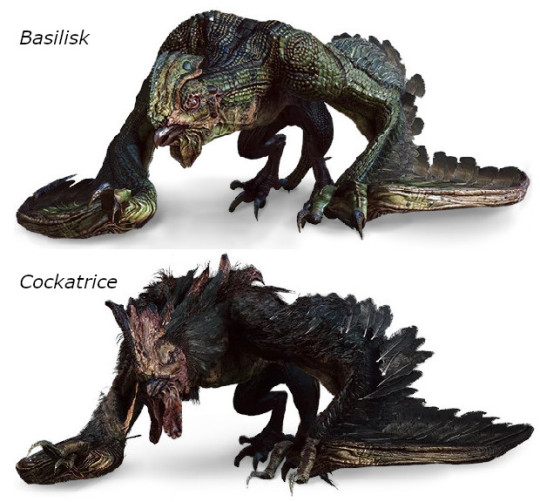
Some of the detail that's gone into translating the world of the Witcher books into the games is just insane – not just in the geography and history of the place, but right down to the names of the wine you can pick up. There's the fact the Cat potion makes Geralt see in black-and-white, or the fact the basilisk and cockatrice monsters are clearly based on the same model, but the basilisk is reptilian where as the cockatrice is more avian – which is exactly how Geralt describes the difference between them in The Lady of the Lake. There's a point where Book!Regis recounts a detailed list of all the lesser vampiric species, ending with the only two violent enough to tear apart their victims: almost all can be encountered in the games, and the last two (Fleders and Ekimma) are indeed the most animalistic. This kind of thing is everywhere.
My favourite examples tend to be those that blend into the background if you haven't read the books, but will get a grin from those who have, such as a peasant in Velen who will call out to Geralt (paraphrased from memory, alas) "Sir, sir! We be up to our ears in mamunes, imps, kobolds, hags, flying drakes... oh, and bats!" – which is a lovely little reference to a couple of conversations from Edge of the World wherein Geralt explains that most of the monsters the locals want him to take care of don't actually exist. Or all those soldiers chanting "Long live King Radovid!" – natural enough, but it takes on a whole new life if you've read the passage in Lady of the Lake where the young prince Radovid grumbles internally about having to sit and listen to the city chanting 'long live...' to every other notable figure present except him.
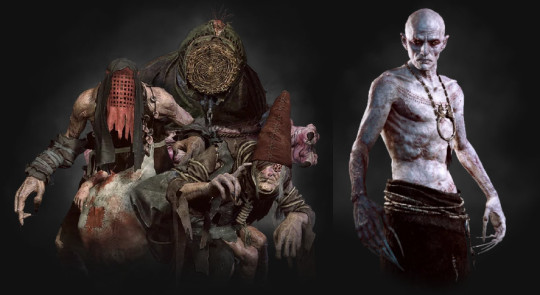
Really, it would be faster to list the things the games introduced that don't come from the original source material in any obvious form, because it's a struggle to come up with very many. The villainous Crones of Crookback Bog and Master Mirror of the Hearts of Stone expansion are the biggest ones that come to mind, along with a great deal of the vampire mythology from Blood and Wine. To the witchers themselves, they’ve added mostly game mechanics: the use of bombs and blade oils, the names of most of the potions, and three new witcher schools (all with their own specialised gear). There are a number of new creatures and monsters – Godlings, noon-and-night-wraiths, botchlings, shaelmaars and so on – and though trolls are mentioned in the books, the games take credit for giving them so much character. Obviously, there are new characters, like Thaller and Roche – but not technically Iorveth, because a Scoia'tael commander of that name is mentioned in the books, if only in passing. And already, short of just listing off every new character the games introduced, I’m running out of ideas. Credit where credit’s due on that front: most of the new characters and locations they’ve created feel authentic enough that Kalkstein or Thaller would be right at home in the novels’ world.
But for all their dedication to the detail, it's hard to feel like the games have really managed to capture the spirit of the books in their storytelling: the mundanely corrupt bureaucracy that does so much to bring the world to life, or their cheerfully cynical sense of humour, or the flamboyant wonder that is book!Dandelion, or their enthusiasm for putting women in positions of power, or the bigger themes about the differences between the story that gets sung by the bards and what really happened – or so much else from the novels that came as such a surprise to me when I started getting really sucked in.
And if we’re going to talk about all the little things they got right, it’s only fair to point out there are just as many little things they got wrong, and sometimes pretty glaringly at that. "I thought you bowed to no-one" says Emhyr to Geralt – almost as if book!Geralt doesn’t happily bow in most every situation where it would be polite or diplomatic to do so. "This would never have happened if the council was still around!" says Geralt upon finding a sorcerer's lab full of human experiments – as if none of his experiences with Vilgefortz or the wizards of Rissberg ever happened, back when the council was very much still around. In TW2, he mocks the idea of a woman like Saskia leading a rebellion – almost as if women like Falka and Aelirenn haven't led some of the most storied rebellions in history (and we can't even blame the amnesia, because Geralt himself mentions Aelirenn later – oh yeah, this one annoyed me particularly).
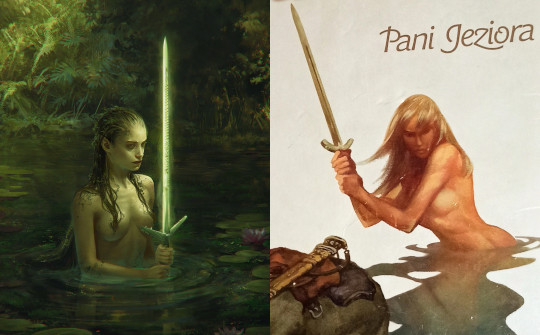
Book!verse 'Lady of the Lake' is basically just Ciri being surprised while bathing
Yennefer's studious aethiesm and willingness to desecrate Freya's temple is entirely in character – but only if we forget that she had her own personal religious experience with the goddess Freya herself in Tower of the Swallow. And then there’s the fact the Lady of the Lake is now a literal lake nymph who distributes swords to the worthy, as if no-one writing for the games ever got past the title of that particular Witcher novel (let alone got the joke). And the list goes on. It's easy to get overly caught up in contradictions like this – it's hardly as if Sapkowski's novels don't contradict themselves in places, as almost any long-running series eventually will – but it's going to stick out to those who’ve read the novels nonetheless.
While we're talking about how the games pick up where the books left off though, the big contradiction that has to be touched on comes in bringing Geralt back at all, at least in any public capacity. There's plenty to suggest that Geralt survives the novels' end and even goes on to have further adventures, but it's also pretty explicit that the history books record his death in the Pogrom of Rivia as final. The last two novels by order of publication (Season of Storms and Lady of the Lake) go so far as to feature characters far in the future with an interest in Geralt's legacy, and they discuss the matter in some depth. As far as the world knows, Geralt is dead.
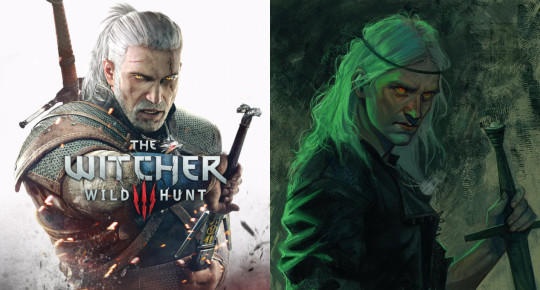
Book!Geralt fanart by Diana Novich
But it's hard to blame the games for ignoring this – true, thanks to Geralt's longevity, they could have set their conflict many more years after those future scenes – maybe even used Ciri's established time-travel powers to let you pop quietly in and out of the past (and, okay, now I've thought through all that, I'm kind of sad they didn't). But there comes a point where that kind of slavish devotion to preserving the source material really doesn't do a story any favours, and I'm not sure I could name any other successful adaptation that's bothered.
Besides bringing Geralt back at all, most of the bigger changes pertain to Ciri. In fact, as much as I'm about to get deep into the nitpicks below, you can make a surprisingly good case that the games have made only one really big change, and that's in simplifying the prophesies surrounding her. See, in the novels, all those world-saving prophesies aren't technically about Ciri, they're about her as-yet-unborn child. Who gets to impregnate her is the big driving force behind most of the villains of the books – one that all the main contenders seem to see as more of an awkward necessity rather than the inspiration for violent lust, but even so. To Emhyr, having to marry his own daughter is a bug, not a feature – but he's willing to do it to become the father of the savior of the world. But if Ciri is capable of fulfilling those prophesies herself, then Emhyr is already the father of the savoir of the world, and the revisions to his relationship with Ciri start to make a lot more sense.
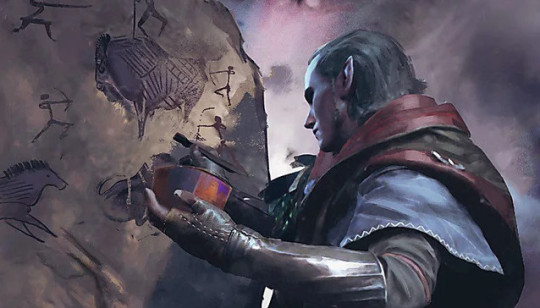
Ciri's history with the Aen Elle elves seems to have been similarly revised – if not quite so cleanly. Avallac’h and Eredin are, naturally, both book characters – in fact, a lot of personality has been left behind in the books, since Avallac’h originally had a rather camp flair, and Eredin is less the power-hungry kingslayer you might imagine. When Geralt meets Avallac’h in the books – which happens briefly in Toussaint, for one of those "everything you're doing is going to make everything worse because prophesy" conversations – he's busy decorating a cave with fake prehistoric paintings in the hope of confusing future explorers. (Surprisingly, there does seem to be official art of this moment on one of the gwent cards – see above – though the Avallac’h who jokes about adding erect phalluses to the picture and admits his vanity won’t allow him to resist signing it hasn’t entirely survived the transition to the new medium).
We also meet the former Alder King, Auberon, whose death we see in flashback in the game. (Fun fact: Auberon is actually blowing bubbles through a straw in a bowl of soapy water when we first meet him in the books, hence the straw in the illustration below. The books just have more whimsy than any of the games would know what to do with.)
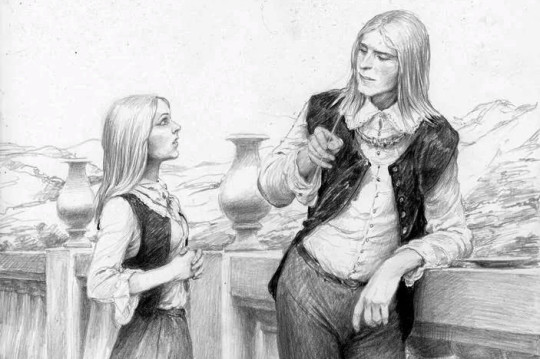
Ciri spends some time in the final book as a prisoner on the world of the elves, who are as keen as everyone else for their king to father her unborn child. Avallac’h eventually convinces her that this is all for the greater good: her child will be able to open gates to allow the people of her world to escape when the apocalyptic White Frost arrives. But their king, like most older elves, is impotent, leading to multiple nights where Ciri allows him to take her to bed (in some of the frankly more disturbing scenes of the series) to no result. Eredin, moreover, doesn't appear to have intended to poison the king: the vial that kills him was supposed to contain some sort of fantasy viagra, and even Eredin seems genuinely shocked to learn its actual effects.
Regardless, Ciri eventually discovers that Avallac’h and the Aen Elle have deceived her, and intend to user her child's powers to invade her world, not save it. Neither world is threatened by the White Frost for at least several millennia, it's just a pretext to make her cooperate. And so she flees, and Eredin (already leading his Red Riders aka The Wild Hunt long before he was crowned king) pursues her.
With the books as context, why Ciri would ever trust Avallac’h is very hard to understand. It's a little easier if that whole awful episode with her and the former king is subtracted out – Ciri's child is no longer necessary for Eredin's goals. So it's odd that the game still references the deadly vial Eredin gave to the king. Are we to suppose the vial genuinely contained poison in this version of continuity? I'd rather it didn't – Avallach's ruse is far more interesting if he underwhelms Eredin's support by revealing a half-truth – but the games aren't telling us.
And then we have to factor in that one last detail I'd forgotten when I originally started playing with this theory: TW3 does contain one last, dangling reference to the time the old king spent trying to impregnate Ciri, when Ge'els very reasonably asks why on earth Ciri would ever trust Avallac’h now. It's a damn good question, and the game offers no real answers. So in Avallac’h, we're left with a character who is vital to the final chapters of the games, who comes out of nowhere without the books as context, but whose role makes no sense with that backstory in mind. Frankly, the writers would have been much better off avoiding the whole mess altogether and inventing some new character to take Avallac’h's place.
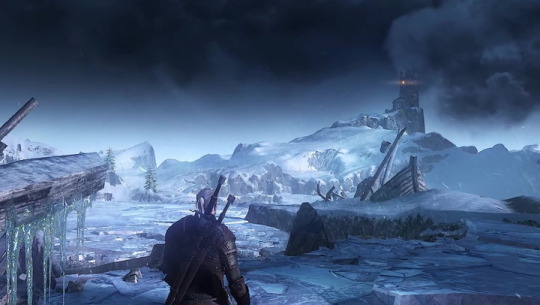
The treatment of the White Frost is even more confusing. The books are ultimately fairly explicit about just what the White Frost is: a ice age, most likely caused by the same mundane climactic factors that produced the real ice ages of our history. The only escape is intergalactic emigration, as Ciri (or her children) might some day enable.
In the games, the White Frost has instead become some sort of nebulous, free-floating apocalypse which will eventually reach all worlds, which is basically fine – up to a point. We briefly visit a dead world that the Frost has decimated, and even the Aen Elle are now supposedly planning to invade Ciri's world because it threatens theirs as well (I mean, apparently – their motivations are so underdeveloped you could miss them by accidently skipping just one or two lines of dialogue). When the Wild Hunt appears, it's always in a haze of cold. Their mages can invoke its power still more dramatically through portals which can freeze you in your tracks. So obviously, the Frost has already reached their world, and time is running out, right?
Well, no – you visit their world too (again, briefly – to meet a character who has never been mentioned before and won't be again, for reasons which have also never been mentioned before if you haven't read the books) – and there's no Frost in sight, apocalyptic or otherwise.
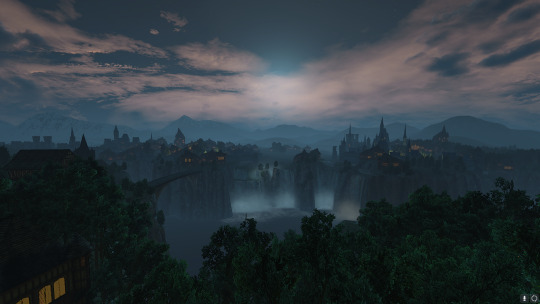
So why does the White Frost follow the Hunt around? No idea. It's never explained.
At the very end of the game, a second "Conjunction of the Spheres" occurs (possibly because of the Wild Hunt's appearance?), and the Frost begins to invade (or possibly Avallac’h summons it, so Ciri can go into it and destroy it?) It's all painfully unclear. The game is too busy pulling a bait-and-switch over whether Avallac’h's betrayed you to tell you what's actually going on instead.
But if Ciri could destroy the Frost completely (at great personal risk, but still) why is this not more clearly set up? Why did the Aen Elle think that escaping to another world (which will ALSO eventually be destroyed by the Frost) was a better solution than sending Ciri to face the Frost directly? For which matter, why do the Aen Elle need Ciri at all if sending enough ships to carry an army is no problem? Why does Ciri spend so much of the game questioning Avallac’h's true intentions, if they were ultimately so noble? When did he tell her the truth? If Avallac’h did summon the Frost, why did he pick that particular moment? And if he didn't, and it all just happened spontaneously, we're back to questioning why invading that world ever seemed like a good solution to Eredin – it all collapses in on itself.
None of these questions couldn't have been answered with a little creativity, but then the game would've had to dedicate some real time to explaining its backstory and developing its core conflict – something it's bizarrely reluctant to do. And if you think I may be drifting from the point a bit in the name of getting all my gripes about the ending down in one place, you're not wrong, but I feel Avallac’h and everything surrounding him is pretty much the ur-example of what doesn't work about the way The Witcher 3 depends on the novels: the backstory the writers are building on doesn't actually exist in any format available to the rest of us.
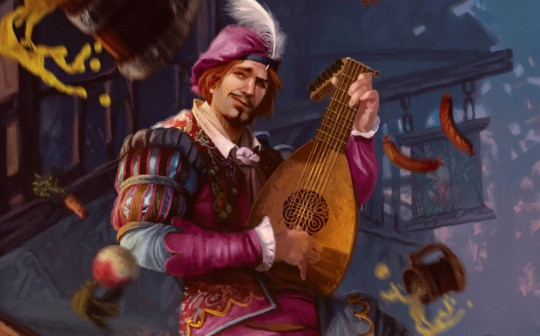
There are plenty of ways TW3 could have incorporated its backstory into its own narrative (yes, even excluding the method "by expecting people to read many many more pages of text from in-game documents", because that's bullshit and always will be). There are times it does this brilliantly, such as in the quest ‘The Last Wish’: everything you really need to know is covered in Yennefer and Geralt's conversation in the boat, and without ever making the dialogue sound unnatural. In fact, TW3 has even more options here than many works with the same problem, because Geralt is famous and people already think they know his story. You could have bards singing Dandelion's ballads, you could have characters confronting him with misunderstandings about his past to force him to correct them. You could also have Geralt visiting people and places he knows Ciri remembers fondly because of the time they spent there together, or include playable flashbacks similar to the time you spend playing as Ciri. You could stick chunks of backstory in optional sidequests or scenes old-school fans can skip through quickly. So many of my questions (how did Ciri get so close to Yennefer if they were never at Kaer Morhen together? Why has no-one tried training Ciri in her powers before? What does the Wild Hunt even do while it's not hunting Ciri? Why is Ciri princess of Cintra if her father is Emperor of another country altogether?) could have been answered so easily.
Seriously, summarising the Witcher books is not that hard. Lots of things happen, but only a fraction of it is really relevant in retrospect, and you could hit all the major plot beats in a handful of paragraphs. (Heck, I’d do it here if this post wasn’t already ridiculously over long.)
But then, TW3 has a bizarre problem with leaving so much of its best material off screen, even from its own story. It's criminal that we never get to see any of Geralt's time (or Yennefer's) with the Wild Hunt, even in flashback or dream sequence. This is material that directly sets up the relationship between the main hero and the main villain, and the most we ever hear about it is a few vague allusions to it being like a strange nightmare. Really? That's it? What was it like? Was Geralt in a trance, unable to control his own actions – was he brainwashed into believing he belonged there, or was he merely unable to escape? What atrocities might Eredin have forced him to commit? Did he visit other worlds? Was he paraded among the Aen Elle as a captive? There is no way this isn’t a part of the story worth talking about!
We never see the moment Ciri rescues Geralt from the Wild Hunt. We never see how Avallac’h convinces her to trust him, we never see the moment he was cursed, or any of her efforts to save him – all these big, story-defining moments are left off-screen, to be vaguely recounted to you later in dialogue. Then there's the entire political situation in Nilfgaard – you hear about it second-hand, and it's all resolved off screen. And the list goes on. Yet you and Ciri still have time to run around Novigrad so she can thank a bunch of throwaway characters you've never even heard of before, nor will again. The priorities on display here are baffling.
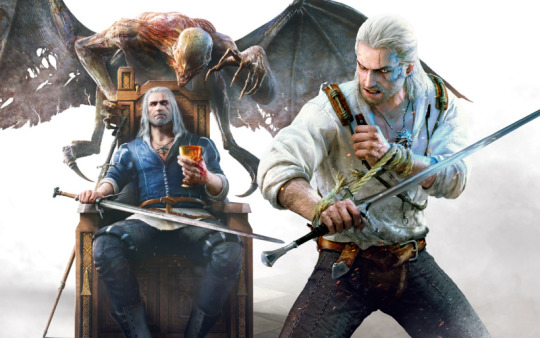
The Witcher 3 was such a wildly successful game that it’s obvious these sorts of issues didn’t seriously hold it back, and it’s such a big game that I could have sat down and written just as many words focusing only on the parts that do work without much difficulty. It boasts stunning visuals, addictive gameplay and some truly wonderful characters, and so many parts of the story work brilliantly in isolation that it’s strange to come out of it feeling that it ultimately adds up to so much less than the sum of its parts.
I’m glad TW3 exists – if it hadn’t been such a runaway success I doubt I’d ever have discovered Sapkowski’s universe at all, but for myself, TW3 will probably always be remembered as a somewhat-overlong introduction to the really good stuff, in the expansions and the original novels it came from. I looked up the novels after finishing TW3 in large part because I’d been left with so many unanswered questions – and I’m glad I did, but I’m honestly surprised more people weren’t turned off by TW3′s scattershot approach to its own narrative. You’re allowed to change and rework in moving to a new medium, but I can’t imagine it would’ve hurt games’ success to tell a complete story in the process.
104 notes
·
View notes
Note
Do you think if they ever reboot ATLA they would make Zutara canon? Reboots have changed quite a few things(the new She-Ra is vastly different from the original) especially with all the support Zutara got post-series
Hmmm, an interesting question. It depends on many things I think, not the least of which being who the showrunners are and the tone they want to set. We may get to see our reboot soon, actually, since there’s a live action Netflix series in the works (they haven’t started production yet though, so don’t get too excited). As far as I know, Bryke is at the forefront, and while that’s great news since it means another abomination hopefully won't happen, it does mean that a Zutara relationship probably isn’t likely since they’re big fans of the Katara/Aang relationship.
That being said, I think it would be a missed opportunity if they didn’t, and I’ll explain why. (Disclaimer for any non-Zutara fans reading this, being a Zutara shipper is not my main motivation for thinking or wanting it to be canon). First things first, the audience. I don’t know if post-series Zutara support would have much of an effect on Bryke, but it’s possible that the producers or Netflix would notice and try to factor it in. However, I don’t think pandering should be the reason they include Zutara--far from it. The original audience that watched Avatar has grown up at this point. Many of us are in our twenties, give or take. We’ve matured, and it would be foolish of the showrunners for ignoring this fact. If there’s a reboot of Avatar, live action or animation, the majority of the audience will be those that grew up with the show, not kids the same age as the audience of the animation. I think that’s evident enough with the release of Avatar on Netflix (notice how many people are rewatching and falling back into their love for the show?) and the comics. Ah, the comics. Some things they did well, others...not. What they did do well is writing the storytelling more maturely than the show. I don’t mean to bash the original show as it obviously had no problems including the dark effects of a war story in bite size, easy-to-swallow chunks for kids (a good thing). However, they treat the audience more seriously, knowing that not everything needs to be spelled out. You see the same in Korra. And to me, that’s part of what makes the Zutara relationship so captivating and intriguing--it’s mature. It’s not easy, and it has faults. It’s not “hero gets the girl after saving the world”. It’s complex.
I’ll say this now: there’s a difference between a relationship being canon and being endgame, and it’s an important difference. I definitely think Zutara should be canon, if not endgame, in any reboot they do.
Personally, I’m excited for a live action version if they ever get around to it. It brings many new factors to the table, and the majority of them have to do with adaptation. (I’ll mainly be talking about a live action version for a little bit, excuse the art student that shows). Adaptation, especially between mediums, is tricky to execute. You see many book-movie adaptations that succeed, and some that miserably fail, and others in between. This goes for other forms as well, ex: book to comic, book to animation, animation to film, etc. With any medium adaptation, the story will inherently change. You can't hear a character's inner dialogue or prose written in a book in a film, so changes have to be made or the filmmaker must write or use film language to substitute for it. With adaptation, changes must happen, that's a fact. To me, more often than not those adaptations succeed when the creator embraces that fact and uses the medium to their advantage. Sometimes this changes the story, and sometimes that change enhances it for the better. Take Game of Thrones or Harry Potter. The former deals with many characters and worldbuilding that is extremely complex, and they did an excellent job in getting you attached to those characters. However, they did have to change some things from the books, and while some weren’t as successful, others did remarkably. (Before anyone starts raging, I’m specifically talking about the seasons where they still had books to go off of). For Harry Potter, we have eight movies to analyze, which I will not be doing, but I will say that the weakest films storywise were the fifth and seventh, simply because they tried to do both too much and too little, if that makes sense.
How would this apply to a live action ATLA? Well, it wouldn’t be like the animation, most likely. It’s a medium adaptation, meaning that the approach they had in the animation won’t work the same in live action. Think about it--you don’t watch animation, especially 2d, the same way you watch live action, psychologically and subconsciously. There’s a separation there between their world and ours. It lessens with 3d animation, but it’s much much smaller when it’s live action since it looks like our world, more or less. Would GOT beheading and other violence (you know what I mean) have had the same effect if it were 2d animation? No, probably not. Yes, I know that anime has its fair share of gore that can be extremely realistic and gross, but it still doesn’t have the same impact it would if it appeared on your screen with quality vfx. Now, these are extreme examples. I really doubt that they’ll make the violence that intense or realistic in the show, as they’ll more than likely want to keep it family friendly (there’s still kids that watch the original). Another disclaimer (ik there’s a lot of them, but people can misunderstand this kind of critique as bashing, which it’s not): I am not saying that the original animation of ATLA is not impactful, absolutely not. I have no trouble getting attached to animated characters, laughing or crying with them, etc, especially if the writing is good. However, it was a kids show, and it was written with that in mind. This is apparent to me as I’m rewatching the show now. There’s some dark stuff that happens, as is the nature of a war story, and the animation handles it excellently. But think of how different it will be seeing the ruins of the Southern Air Temple, practically a garden of bones, Gyatso’s included, in live action. Show us all the nitty-gritty of the lower rings of Ba Sing Se, and the corruption up top. Let this affect the characters. Bring this moral ambiguity into light, as it was done in the show. I think that if they’re going to tackle a show in this way, not a movie or series of movies, it would be smart of them to lean into these darker themes, not shy away from them. Like I said earlier, the audience has matured, and there’s so much more to explore with these stories and themes. I’ll say with confidence that they’ll definitely do this, and possibly add a story or two. Otherwise, it will just be a rehashing of the original, word for word dialogue. Not that the original is bad (obv not), but I don’t think we should want that. There’s a lot of potential in a live action series, and I think they’ve learned lessons from the abomination that already tripped over itself. It was an example of adaptation done badly. However, you can change a story without destroying it, but it’s a delicate operation. That’s why having the original showrunners on gives me a bit more confidence. To be clear, I don’t think they’ll go full PG-13 or higher. It’s still possible to have family/kid friendly media without shying away from the darker parts. ATLA is a great example of that. If you want a live action example of a show that balances humor, heartache, and violence beautifully, look at Merlin (bbc).
I think you bring up an interesting point with She-Ra and it’s divergence from the original. I haven’t seen the original animation, but I can say that the new one was successful in telling a new and fresh story in the same universe. The act almost as parallel stories in that universe. How To Train Your Dragon is the same way--the book and movie have very very little in common story wise, but it’s a beautiful trilogy nonetheless. Would this work with ATLA? Possibly, though I doubt they’d want to stray away from the original’s core themes. Though, you can fight me on this, Zutara does align with those themes, but that’s another post (this one is long enough). However, it’s such a complicated question because it inherently considers countless possibilities, so there’s no definite answer. It’s a beloved show that’s already been butchered once, so how much would they be willing to change?
Now, how does Zutara factor in? (getting to the point now). For many of the reasons above, I think it should be canon. Their dynamic, their rocky relationship, the journey of trust and acceptance, the connection they have, all of it is ripe for exploration, especially in a revamped, inherently more mature story. Instead of a predictable relationship where there was never any real conflict (Katara was always loyal to Aang, and their fights were never truly consequential), you have a relationship coming from a difficult, seemingly impossible place, one that requires time to establish. Like I said, it’s not an easy relationship. Part of it is strengthened by Zuko’s wonderful redemption arc. He needs to build a foundation of trust before almost any of the Gaang trust him (Aang, the angel, is willing to give him a chance almost immediately in Book 1, and though she didn’t care one way or the other at first, he did accidentally burn Toph’s feet). What would a Book 4 have brought us? Despite what Bryke say about it being a false rumor, Ehasz, a co-producer, said that it was at least discussed, plus Book 3 definitely had more to give, so I take it with several grains of salt. Anyways, even wondering about it hypothetically produces interesting theories. We see at the end of Book 2 in the cave that Katara, once she overcomes her immediate, and warrented, repulsion of Zuko, she’s able to connect and see a bit of his heart underneath the layers and layers of angst and anguish obscuring it. This scene is popular in the Zutara fandom for a reason. However, I think that making changes to characters, especially in Zuko’s case should be done extremely selectively and purposefully. His arc is one of the most fantastic accomplishments of the show, and I think very little should be changed. For example, he should still make that doomed, yet inevitable choice in that cave to join Azula, but perhaps they’ll include his mother as a more forefront character, especially when he goes back to the Fire Nation. By all means, give Ty Lee and Mai more than just a conversation to supply their backstory. Thoroughly explore the swampbenders and the Freedom Fighters. Show more of the original airbenders in Aang’s memories! There’s room for exploration without dismantling the world or characters like the M. Night film did. For Zutara, I think that expanding Book 3 and giving the characters more time with each other would be invaluable. Think of how quickly Katara and Zuko grew close, from Katara threatening to off him first time he even hinted at being a threat, to becoming one of the most instinctual and formidable teams in the Gaang, to saving each other’s lives in the final battle. That’s not even mentioning the Southern Raiders. The conflict over the entire show as the backdrop for a relationship like that, romantic or platonic, is incredibly suitable for a reboot. If it was explored, the outcome would be so powerful.
I said before that there’s a difference between canon and endgame relationships. This just means that a relationship can be confirmed and explored without being the outcome. If Bryke include Zutara at all, that’s most likely how they’ll do it: adding a love triangle that ends up with Katara and Aang getting together. Honestly, it would be a method of making K/A a more interesting relationship and a way to have the characters grow a bit. However, this has the awful potential of just shitting on Zutara and turning it into a toxic relationship, which I’d rather not see.
But if it wasn’t Bryke running it? Absolutely, I think Zutara would, and should, be canon. Adaptation should take risks and be willing to explore, and I think Zutara is the type of dynamic we should see.
#zutara#atla#atla live action#avatar the last airbender#zuko#katara#sorry this got really long i have a lot of feelings
75 notes
·
View notes
Text
Gochiusa BLOOM episode 3 impressions
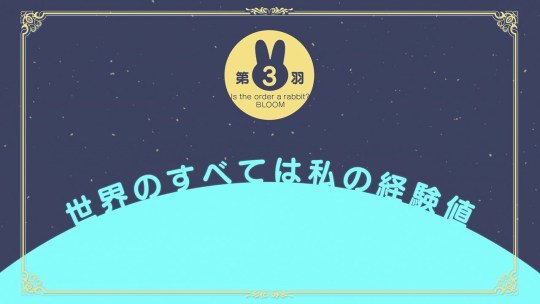
Previously: episode 2, episode 1 (seriously, the number of notes on ep 2 review is too low...)
Welcome to another review of Gochuumon wa usagi desu ka? BLOOM. In this episode, the series explores a topic it rarely touched previously, which is school life. Unlike many similar slice-of-life series, Gochiusa rarely concerned itself with such a mundane setting, preferring the ambience of cafés and cobblestone streets. There were a few exceptions, such as the first half of season 2 episode 10, but this is the first episode fully dedicated to a school setting.
Another distinguishing trait of Gochiusa is that the group of main characters attends not one, but several different schools. In particular, there are two high schools: a “normal” one attended by Cocoa and Chiya, and an “elite” one attended by Sharo and Rize. Moreover, there’s a group of middle school characters on the verge of graduating. As such, the question of which high school will Chino, Maya and Megu eventually choose was bound to come to the forefront at some point. And that’s exactly what happens in this episode.
There’s a lot of interesting stuff to discuss, so let’s get down to business...
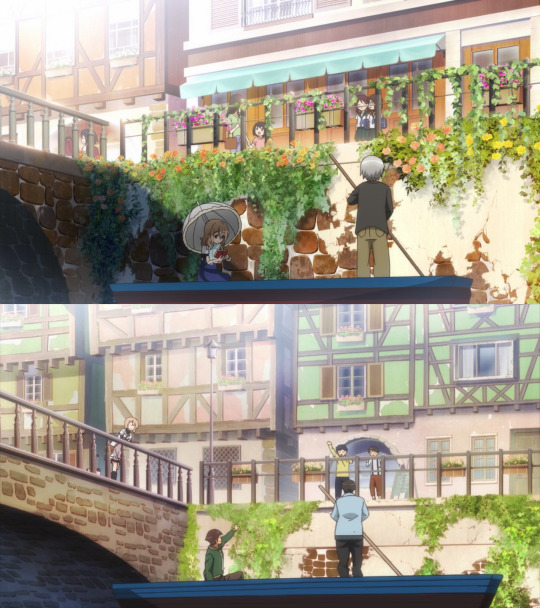
The episode opens with a shot of Aoyama Blue Mountain on a boat, which also appears in the beginning of season 1 episode 1. By the way before COVID you could totally ride a boat like this in Colmar. Just watch your head...

Yeah, this is under the bridge from season 2 ED. Filmed by me.
Anyway, I’m being sidetracked. What’s important is that this is the only shot where you could tell it’s morning, because of the angle of the shadow from the bridge. It is indeed morning, and we see Cocoa and Chino walking down to school. Seems the summer vacation is over and it’s already September? Cocoa, the self-described pikka-pika no onee-chan, tries to coerce Chino into committing to enter the same high school as her, while Chino is not sure about that. We’ve seen Chino being unsure about her future as recently as this season’s episode 1, and in regards to the high school choice the time for a decision is quickly approaching.
Soon we see Maya and Megu who are facing the same decision. Megu seems to have already decided on what Maya derisively calls the gokigenyo school. The greeting gokigenyo (ご機嫌よう) comes from the word “kigen” (機嫌) which means “mood”, and can be literally translated as “how do you do”. However the same word is also used as farewell, which often causes troubles for translators.
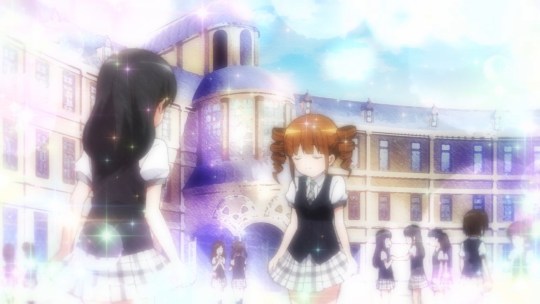
The concept of “gokigenyo school“ has been popularised by the light novel and anime series Maria watches over us (Marimite), which is also one of the most influential works of the yuri genre. This concept has also been parodied a number of times, for example in the excellent episode 5 of Flip Flappers.
Megu manages to convince Maya and Chino to come with her to a tour of this school, and we get a close-up of Maya hinting that she’s definitely hiding something.
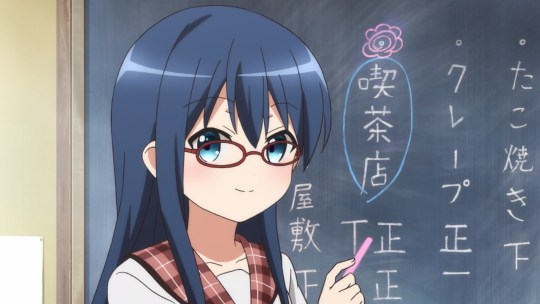
Meanwhile at Cocoa’s school, the class president declares the theme of the cultural festival being “cafe”, and puts Chiya and Cocoa in charge of it, because they work at a cafe. It seems that Chiya is considered to be more dependable than Cocoa by her classmates, since she got a higher rank. Nevertheless, it is Cocoa who mostly delivers the speech to fire up the other students.
Note the usage of Chinese tally marks to tally the votes. The five strokes comprising the character 正 (”truth”) equate 5 votes. This method is popular across East Asia, even in Korea where Chinese characters are no longer used.

Also I’ve seen a lot of people were confused by the inclusion of “sex museum” as one of the proposals, which is how 秘宝館 (hihokan) has been translated by the official subtitles. This word, which literally means “the hall of hidden treasures” has been used by various establishments of this type in post-war Japan, however only few of them remain open now. I think “sex museum” is a bad translation because, while technically correct, it breaks mimesis, or in simpler terms, immersion. The English translation is so blatantly inappropriate that it would never make it onto this blackboard, whereas the Japanese word is obscure and innocent-looking enough that it just might. A better translation would be “adult museum”, in fact that’s what the most well-known hihokan, Atami Hihokan uses for its English title.
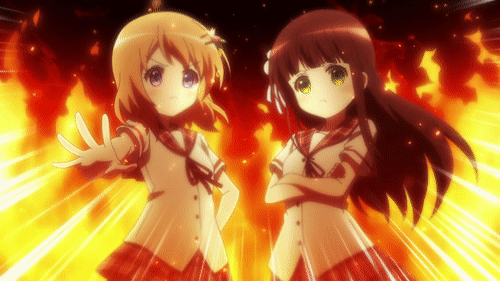
As proof of each other’s ability, Cocoa mentions Chiya’s triple tray wielding skill (お盆三刀流 obon santoryu) which has been demonstrated in season 2 episode 1. Chiya brings up Cocoa’s “basking in the sun” (日向ぼっこ hinatabokko) attitude which supposedly makes her popular among customers. This is a reference to season 2 episode 5 where Rize says Cocoa always either practices latte art or basks in the sun.
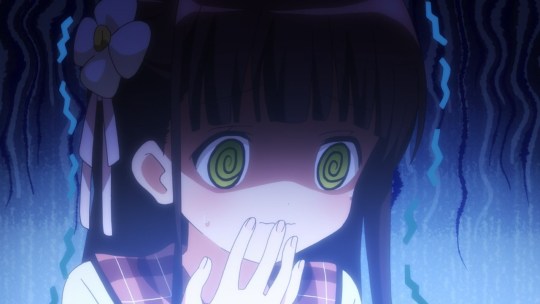
On the way back from school, we learn that Chiya is actually scared of the responsibilities placed on her, and her dream of becoming the president of Ama Usa An franchise (which has been mentioned in s2e1, s2e9 and maybe other episodes I forgot) might be ruined because of this. Cocoa consoles her, again showing her motherly side.
Back at Rabbit House, Cocoa explains how the upcoming festival will be exciting (wakuwaku) and fluffy/cuddly (mofumofu). This is one of several times Cocoa uses silly onomatopoeia to describe something in this episode (aforementioned pikkapika onee-chan and describing her school also as mofumofu in a latter scene). Interestingly, all of these lines are anime-original, and at this point seems like an intentional effort to make Cocoa speak in a more eccentric manner.
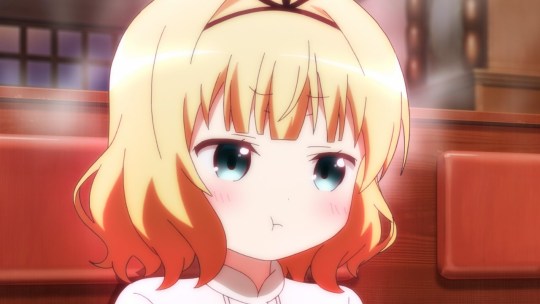
In the next scene Sharo becomes angry at Chiya for keeping secrets from her, and blows her cheeks, which makes her turn into a Fugu fish, according to Chiya. Fugu is famous in Japanese cuisine for being a highly poisonous but sought after delicacy, however in this case the comparison has to do with the tendency of a live fugu (as well as other pufferfish) to inflate its stomach, giving it an almost spherical appearance to deter predators.
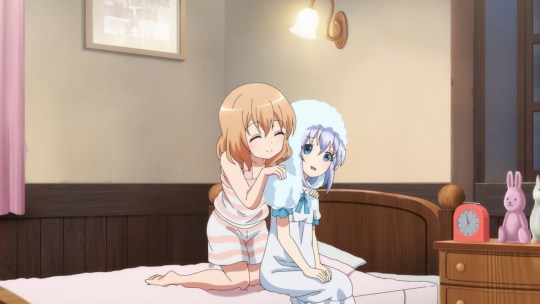
Next there’s another anime-original CocoChino scene where Chino asks Cocoa about what her school is like. This is my favorite part of the episode because it’s just so adorable. Like, even the fact that Cocoa is drying Chino’s hair with a towel after bath shows how close they became. The direction and the delivery of the dialogue is masterfully executed. Cocoa would be really hurt if Chino chooses any other school, and Chino knows that. But Chino can’t admit she’ll choose her next school because of Cocoa, at least not yet.
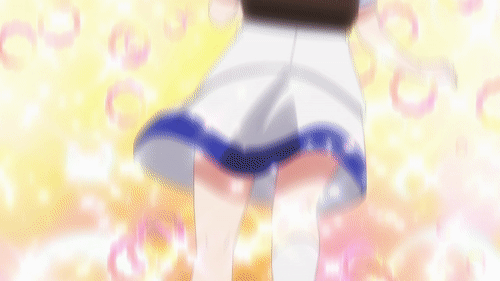
Now we move on to the main plot of the episode, which is Chimame visiting Rize and Sharo’s school. Like I said in the preview, this episode covers chapters 10 and 11 of the volume 5 of the manga, which in-universe occur at the same time. However while it fully covers (and has the same title as) chapter 10, only the first half of chapter 11 is included. So about 2/3 of the episode are dedicated to the story of chapter 10.
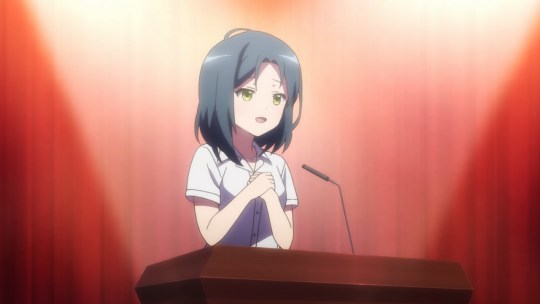
Chimame attend a speech by “OG” Mate Rin. OG in this case doesn’t mean “original gangsta”, but “old girl”, which is a Japanese term for female alumni of some school (there’s also OB for men). Chino recognizes Rin as the editor of Aoyama Blue Mountain, and I’m not sure if Maya and Megu ever met her, so they don’t. When Rin recalls a senior who turned her life around, Chino recalls her chance meeting with Cocoa. In particular the phrase deai ga taisetsu (”chance meetings are to be cherished”) sticks with her. On the other hand, Maya seems to be interested in the fact that Rin was recommended for scholarship. Interestingly in the manga, Maya slept through most of the speech.
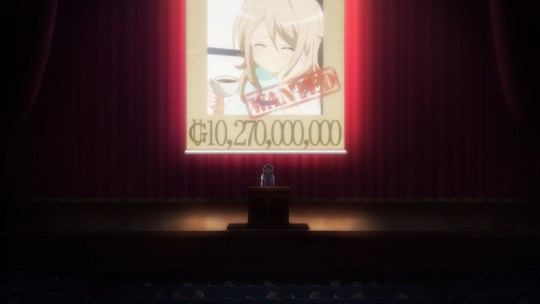
The senior Rin was talking about was obviously Aoyama and we see that there’s actually a huge bounty placed on her. The currency sign consisting of combined letters G and U wasn’t seen before, with prices usually displayed in yen, but there was a Euro-like sign at an open market at the beginning of season 2 episode 1, which might be a shorthand way to write GU. Either way this currency must have a serious hyperinflation problem as the reward for finding Aoyama exceeds 10 billion GU. In countries affected by hyperinflation, a stable foreign currency is often used to perform economic transactions, which might explain why most of the prices are in yen.
But is there some significance to this exact number? Why, yes, 10/27 is Aoyama’s birthday! It is also the start of “reading week”, which actually lasts 2 weeks, until November 9.
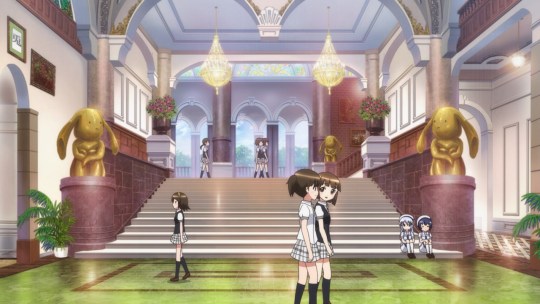
After the speech Megu gets separated from the rest of the group, and the other two also get lost in the vast campus of the school. As seen from the above interior shot of the school, it is also inexplicably rabbit-themed (or maybe just this particular hall is), with golden rabbit statues and also a picture on the left wall with the kanji for rabbit (兎).
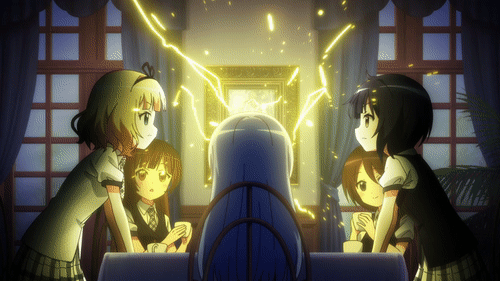
Through a series of misunderstandings Chimame end up infiltrating the school with Sharo and Rize providing uniforms for them to blend in. Despite having trouble to behave “ladylike” before, Maya naturally blends in once she treats it as a game, and even gets invited to a tea party. She makes a mistake though by mentioning moyashi (bean sprouts) which is considered a cheap and low-class food, but she’s saved by the fact that the rich girls don’t even know what that is, and Sharo explaining how to prepare it in a fancy way.
Eventually the groups meet each other and Maya reveals she has been recommended for scholarship due to her good grades. Perhaps she also treated her school grades as experience points to gain, as the title of the episode (and the manga chapter) ”The whole world is my experience points” seems to suggest. This is the idea behind a real concept of gamification, by the way.
There’s also a callback to the season 2 episode 8, where Maya asks Rize for advice while Chino and Megu are spying on her. It is worth to rewatch that scene, because it’s full of foreshadowing for this episode. Back then Maya thinks she’s the only one of the three to go to this school, but now she thinks there’s a good chance all three will still go to the same school. Chino doesn’t seem to feel this way though.
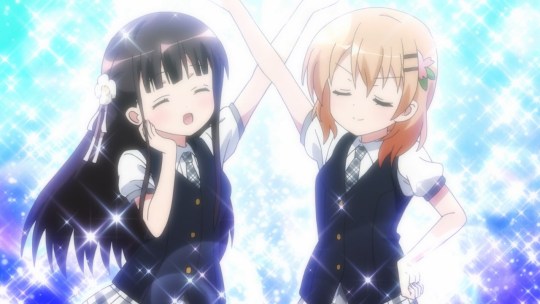
In the end we see Cocoa and Chiya joining the group, also wearing the elite school uniforms, which is briefly explained by them gathering supplies for the cultural festival. I guess the next episode will explain how they ended up there. In the manga even the fact that they have a cultural festival wasn’t revealed until this point. Also in the manga fukiya club president, Karede Yura, inexplicably appears for just one panel so that Cocoa and Chiya could thank her, without any lines. In the anime she appears just as (if not more) suddenly, however there’s some foreshadowing with her inviting Rize to a tournament earlier, and she gets quite a few speaking lines.
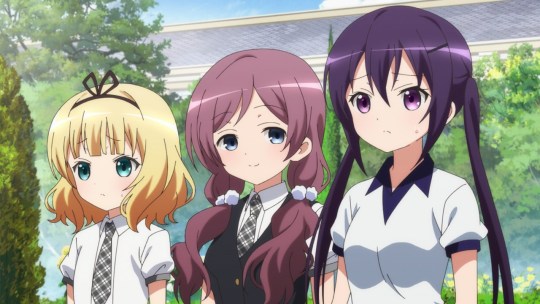
If you listen closely there’s a funny sound effect as she looks at Rize, and then at Sharo. I really liked her design since her first appearance in the manga, and Koi probably does too, as her role has greatly increased in the recent chapters. Consequently her single-panel background appearance has been expanded as well in this episode, she got her full name mentioned in the credits, and there’s even a Karede Yura character song included on the second BD volume (which includes this season’s episodes 3 and 4). All things considered, I fully expect Yura to appear in the episode 4 as well.
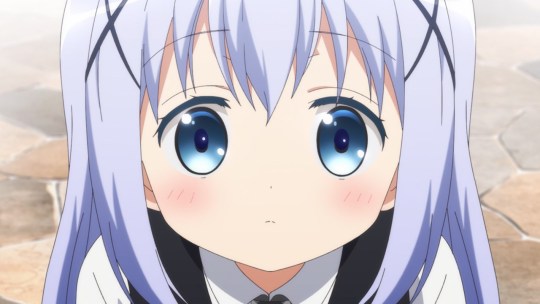
The episode ends with Chino looking at the sky with a worried expression. It just hit her that both Megu and Maya are going to a different school than she is expected to go to. As Megu and Maya have a clear path forward, Chino’s future has become even more uncertain, and she feels like the odd one out in the group. Now the part of the ending where Chino is suddenly alone makes sense:
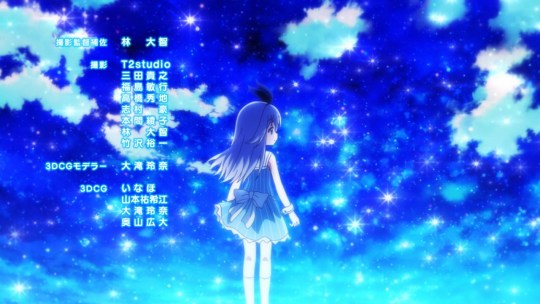
this is basically her imagining the future where Maya and Megu leave her. The coffee cup transition symbolises Chino waking up and seeing that MaMe are still her friends and aren’t going anywhere. We’ll see though...
This time it’s Megu doing latte art in the ending, and the picture is of Chino and Maya dancing. The weird thing is, Megu wasn’t even present at this scene, so how did she draw it in such detail?
Also another random fact I noticed: Chino’s Alice costume actually appeared in the opening of both season 1 and season 2. Here’s a comparison for reference:
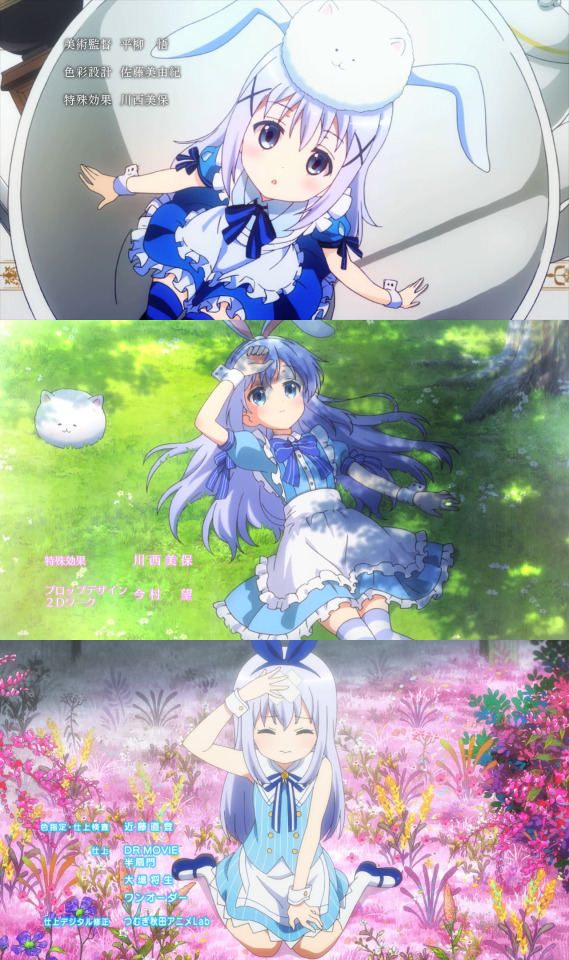
Anyway, that was the third episode of Gochuumon wa usagi desu ka? BLOOM and I hope you enjoyed reading my review. See you next week... or so.
10 notes
·
View notes
Text
The first comic: Maturity or rather the lack thereoff.

Something I commonly saw within the last decade was people arguing that animation has reached a new peak by the amount of quality in storywriting put into them and some even claiming cartoons have become more mature, particularly compared to shows of the 80s and 90s. Dobson too joined the trend and as such made this little comic in 2015 titled “Mature”, in which he argues that cartoons for children are more mature and handle serious subjects better than any media tagged with an r-rating or not following the format of animation.
While I admit that the comic is not the most offensive and insulting thing Dobson has ever created when soapboxing about nerd/american culture, I do think “Mature” actually in composes quite a good insight in how Dobson does not understand concepts of storytelling and overhypes the achievements and merits of children entertainment to a degree that is hurting the “cause”. Which greatly annoys me as a fan of storytelling and animation in general and paints Dobson as incompetent in the field of work (cartoonist, comic writer/artist) he tries to engage in. And I can bring this lack of understanding by Dobson down by just one simple question:
What exactly counts as a mature subject here?
Dobson randomly accuses any form of fiction that is not a children’s cartoon or comic to have no idea how to approach a “mature” subject, but he can’t even give an example of what he defines by this term.
See, for me a mature subject is e.g. an social, emotional or political issue we as humans can correlate to in the real world. Either as a result of personal experience or a bigger picture in our history and culture (such as racism, poverty, existential dreed, personal/emotional growth, any form of oppression etc.) Something that does not only drive a story forward as a source of conflict or a character’s backstory/arc for the sake of entertainment, but may even make us think afterwards.
And as much as I like cartoons, I do not think this is something children cartoons do most of the time.
And before I get accused of thinking cartoons are only something for kids or that a thoughtful story can not be told via the medium of animation, let me put a few things into perspective.
Unlike Dobson, I do not have an educational background in animation. However, I grew up with a lot of cartoons, animated movies and comics from all over the world and thanks to the wonders of the internet read up here and there on the different ages of animation and certain tidbits in what went into the making of certain works of fiction and why they may have been a huge thing in the time periods they emerged in.
As such I know that the medium of animation can be used to not only create “child appropriate” content, but also movies like Barefoot Gen, Fritz the Cat, Felidae, Animal Farm and so on, which tackled themes of social issues, political worldviews and personal/historical tragedies.
Then there is the fact, that depending on the culture, there are very different interpretations in what can be considered “child appropriate” in certain parts of the world and therefore what themes a cartoon may tackle. Like how in European children cartoons such as Alfred J. Quack there was a story arc resembling the rise of Adolf Hitler in power, to tell about the heroes of the show working in the underground against an obvious fascist regime. Or how in certain Japanese children shows the subject of death can be rather common, while in American cartoons just mentioning the word “die” seems a red flag to some studio executives. Lastly, a lot of early animation, (particularly western animation) did not even start off as something targeted primarily at children. Animation started off as a technique to tell a story through “moving pictures” and some of the first animated shorts ever had a huge fanbase of adults and children. “Snow White”, Disney’s first animated movie back in 1933 was a technical marvel at the time. A movie we nowadays mostly consider a children’s movie with a slightly dull story compared to other Disney outings, was back then a risk that earned Disney multiple Oscars and was appreciated more by adults than it was by children, despite being based on a fairy tale. A type of story mostly considered “appropriate” for kids.
What I am trying to say is, that I am aware of how not all children cartoons are the same and can vary in terms of “maturity”. Something I think Dobson can’t, because he also can’t see that there is a huge variety of “children” cartoons.
Despite his background and claims to consider animation an art, Dobson has shown a huge lack of knowledge or admiration for shows/movies that do not fit into the specific mold of “western animation primarily targeted for children and airing on american television”.
And that is not a claim I make half-heartedly. I have done research on the guy, I know how he likes to brag when he considers he found a great cartoon or something interesting. So I find it telling that aside of nostalgia for certain 80s and 90s cartoons we all know, Dobson’s recommendations and taste in shows seems to be primarily focused on just the most recent stuff everybody else likes/a very small pool of rather generic shows. I am not saying he should be contrarian on principal and e.g. dislike Gravity Falls, but he lacks initiative to look out for new and old stuff himself.
I in fact remember when he asked twitter first if he should give Wander over Yonder, one of the best cartoons of the last decade, a chance, cause it seemed he was too chicken to have an opinion on his own.
Then again, weirdly enough, Dobson actually tends to be contrarian for the sake of it, till someone he respects or sucks up to tends to have a different opinion on a show/movie. For example, while he acts like Frozen is a great movie franchise and defends the second movie to the point he becomes anti-feministic when a woman has a different opinion than him on it, he actually gave the first movie a terrible review on deviantart back in 2014. Accusing it of “same face syndrome” and a shame to the name of Disney. Obviously that was also before the hashtag #GiveElsaaGirlfriend became popular and he went so far as to hint he thinks an incest ship with Anna was great. And Legend of Korra? According to first deviantart posts by him garbage. Which was an opinion swiftly changed the moment Korrasami became popular in the fandom by season 3.
The point I want to make with this digression is, that there are a lot of past actions by him hinting on the fact that Dobson kinda despises animation, when it does not fit within a very narrow niche of things he likes. Further indicated by his disdain for “adult” animated shows or hostility towards foreign animation, except the occasional movie by Studio Ghibli for example.
Because of this lack of a bigger picture, I do not think Dobson is aware how in terms of story, cartoons can heavily vary. And when it comes to mature subjects, you can’t really engage with them if you lack a story carrying them in turn. Let’s look again at the comic. What cartoon characters do you see in it, when Dobson talks about how he believes children cartoons “treat these (non-defined) mature subjects with FAR more respect than the hardest “dark, grim and gritty” stories”?
Pinkie Pie from My Little Pony, three main characters of Spongebob, Steven Universe, Courage the Cowardly Dog, Blossom from the Powerpuff Girls and Mickey Mouse. You want my opinion on them? None of them are from any cartoons tackling mature subjects in a huge manner.
However, they are from great shows. (Well, everyone but Steven, but I explain that later.)
See, this is where putting cartoons into perspective within the vast history of animation, comes in handy. Cause looking at them it is undeniable that people put effort into these shows. Effort in the animation and the writing in order to create an entertaining product, decent enough that not only little kids can enjoy it as a mindless distraction, but even older people can find merit in it, thanks to characters with decent personality, good humor, world building and even an engaging story. But all of that doesn’t make these shows or any story necessarily tackle a “mature subject”. Sure, the latest incarnation of My little pony was not as saccharine as its predecessor but rather cartoony as a good 90s show, but that doesn’t mean the new version is the Schindler’s List of animation (excuse the hyperbole). Same for the other cartoons, with Dobson also not acknowledging the fact that Spongebob e.g. had quite some dips in quality over the years (and even made pretty awful jokes about serious subjects such as suicide) or that Steven Universe, while tending to tackle mature subjects for its story (like trauma, war, abuse, self esteem issues, racism, rape and homosexuality) has failed multiple times over its run (even back when this comic was made) to treat these subjects not just as plot and drama points, but also with enough respect within the narrative, to the point a lot of former fans of the show turned their back on it, cause they had enough of the issues they could relate to being simplified and resolved in a cookie cutter manner so Rebeca Sugar could tell a whimsical story about gay space rocks and forgiveness.
Let us not even forget the fact, that while there is a huge number of cartoons with decent writing and value to them (and that those were not only created within the last 10 years or so), there is also just a lot of garbage out there that counts as “kids animation”. Cartoons and movies that were written with not a care in the world and at times outright more mean spirited as some of the stuff Dobson likely hates in life action. Are you telling me those toilet humor driven garbage piles of creativity are mature?
The point I try to make is, Dobson’s GENERAL statement that kids cartoons tackle mature subjects better than other form of media, is factually wrong, because a lot of shows don’t even try to be mature in the first place. Which however does not mean, there aren’t attempts made at being mature or tackle a mature subject.
Growing up with cartoons since the 90s, I saw quite a few cartoons once in a while having episodes with themes to them that were surprisingly “dark”, dramatic or related to issues I and other kids could also see and relate to in the real world. Bullying going out of control, eating disorders, school violence (even school shootings), dealing with the passing of a loved one, to name a few basic ones. Gargoyles and Hey Arnold were two very important cartoons for me in that regard, with Gargoyles showing me how dramatic a good action cartoon could be when compared to other action cartoons at the time (like Ninja Turtles) and Hey Arnold episodes like “Helga on the Couch” giving me a rather somber look into what “therapy” looks like closer to reality, while normally being a show with the slice of life adventures of a kid in the big city.
And I do highly appreciate that nowadays there are more cartoons doing ongoing storyarcs and as a result of actually having more drama to them, adding tension and character development to their plots. Things we did not quite have to the degree we have nowadays back then in the average show. But it is debatable if those things are equal to “mature subjects” such as racism, abuse or trauma. Cause at the end of the day, a lot of kids cartoons tend to only scratch the surface of those things in order to flesh out a plot, instead of making the plot about those issues. Which at times is even for the best if you ask me. Cause we should not forget, these shows and movies are made for kids. And because of their age, a lot of kids lack at times the knowledge and experience in life to properly understand the themes and subjects some people may try to convey with their work. Particularly when you want to tackle subjects such as trauma, abuse and war which lets be honest, a lot of people can’t even comprehend in their complexity as adults. So how are kids supposed to comprehend them? One way, in my opinion, is by simplifying them and turning them into part of a narrative instead of the main focus of the narrative. But that in itself doesn’t always work and can have negative consequences in multiple ways. For example by making the story suddenly non engaging, delivering the subject in such a manner that people can get the wrong message of what you are trying to say or (at worst) simplifying it to such a degree, it becomes outright offensive to others.
A good example that comes to my mind for that would be how Captain Planet back in the 90s tried to tackle the subject of AIDS in one episode. On one hand, considering how the disease was a big deal back then but no one openly talked about it, you kinda have to give credit to Captain Planet to tackle it. On the other hand, is a subject such as a deadly disease that back then was barely researched and killed millions, really something you want to tackle on an overly preachy (but considering whose company produced it, also very hypocritical) kids show, where most of the time the solution to a problem was not even grounded in reality? And spoilers, the episode treated AIDS not even as the big deal it was, but as something the villain would exploit to spread a rumor on the ill kid, because that somehow equaled a chance to pollute the world more. Not really mature, if you ask me.
What all of this ranting is boiling down to, is that Dobson failed to make a case for how kids animation is able to tackle mature subjects, by not putting his opinion in the bigger context of what animation is/can be and what he means by the term “mature theme”. All he did was just indirectly soapbox that he thinks every other form of media is incapable of being about a serious issue, in doing so also insulting the art of storytelling in itself by disregarding anything not expressed in funny pictures specifically made for children or manchildren on tumblr who want to act they are the big boys, cause a cartoon horse made them feel sad.
He did so by making a very weak argument, not being able to present it in a manner that was hard to debunk and by drawing a comic in which everything looks surprisingly lifeless and like the least amount of quality and effort (things I argued can make a great cartoon) was put into it.
Which ironically, is the total opposite, of being mature.
And lastly, can’t believe I have to say that, but Dobson, the Pokemon’s name is Butterfree, not Butterfry. Butterfry is what you get when you make a statue of a Futurama character made out of something you put on your bread.
47 notes
·
View notes
Text
how I run my blog
Tagged by: as usual I’ve stolen it from @mynameisanakin Tagging: no one, i am too lazy and i follow like 14 people so. just do it if you want to.
SPEED: is not my forte. I try my best, but there are several factors that work against me in this aspect: 1) I’m a chronic procrastinator 2) I’m scatterbrained 3) I have more than one blog 4) I almost never write replies that are less than two paragraphs and I want it to make sense and be good and be enjoyable for my partner, so it takes time. I almost never reply the same day (MAYBE on discord, because there my replies are way shorter and it’s mostly to my best friend), and you’re lucky if I reply within a week. I really try to be faster on this blog because I made a promise to myself (and I was doing okay until the whole virus thing happened and I ran into a bunch of personal problems) AND I am keeping a low profile on this blog so it doesn’t get overwhelming. Long story short, if you are looking for a super active daily replies partner, I am not it for you. If you’re okay with waiting for a while but getting more developed stories and longer replies in turn, then we should talk :)
REPLIES: Are on the longer side on this blog. I don’t really have the patience for one liners because they tend to go nowhere and then feel like bread crumbs of randomness all over my blog. They’re okay sometimes, but more often than not they feel like crack. Writing replies is really exhausting for me sometimes, but I try to force myself because I WANT to do it, I’m just having issues concentrating on one thing at a time so it takes me forever.
STARTERS: I don’t write welcoming starters because 8 out of 10 times they get ignored or are so random that they lead nowhere. If someone writes me a welcoming starter, it depends on the content but usually I’ll try to make it work for me and reply. I don’t often like starter calls because most people write absolutely pointless starters. For example they’ll write a paragraph of explaining what their muse did all day (unrelated to my muse), then walk into some random place they’ve never been to (e.g. a shady bar) and suddenly get surprised by my muse being there, and/or, my personal favorite, say something like “what the hell do you want from me”? Which I struggle with for several reasons. One, if you create a setting but don’t bother explaining why we’re there, you put the entire weight of explaining that (aka creating the actual setting) on ME, but you add an additional complication by making it something that I didn’t come up with, so now I have to introduce a world YOU invented with 0 idea of why you chose that particular location in the first place. Second, you put my muse in a situation that makes no sense for them and again force me to explain that, without even giving me a good reason to. And third, I play very different muses, but most of them are going to lose interest in the conversation immediately if the first thing you say to them is rude af. So, yeah, I actually really struggle with most random starters. Please just plot with me and then I will love you forever for writing me a plotted starter that I know will not create 400 questions in my head that I then have to bother you with, which makes me feel like a nuisance. (Or at least keep the setting neutral? Or try to come up with something that seems reasonable for my muse? I always try to do that and when I am unsure, I message the person who liked my starter calls.) Speaking of which, I rarely post starter calls, because.. well, like I just kind of explained, it’s comes with responsibility and work. And I’m lazy.
INBOX: is open for memes at all times, and questions of any kind. I often don’t get notified, so I sometimes see certain messages months later - when that happens, I usually don’t reply anymore if they’re anon because I’ll assume that person forgot or isn’t even around anymore. Sorry about that! It’s an issue I’ve had on several blogs and I don’t know how to fix it. Anon hate is deleted without comment, unless I feel there’s a point in replying to it publicly, or if it’s entertaining. I don’t roleplay via inbox and therefore any “ic” questions or interactions posted in there will be treated as a one-time meme, if I can reply to them at all. Asks of sexual nature from complete strangers will usually be ignored because Obi-Wan isn’t the muse for that at all. As I’ve stated in my rules I only roleplay with mutuals and therefore won’t roleplay with someone I don’t follow, even if they ignore that rule and start rping with me via inbox. I don’t mean to be dismissive, but I have these rules for a reason and I ask that people read and respect them.
SELECTIVITY: I am selective with whom I follow because I have limited time and energy for this blog (and all my blogs) and therefore find it irresponsible and pointless to accept 600 followers and threads when I know I can’t possibly reply to even 10% of them. Before I follow someone (back) I look at their blogs; in particular at their writing (to see if I like their style and their portrayal), their rules (to see what they like/dislike and if our general understanding of the RPC, roleplay, and in a way social interactions in general go well together), and sometimes their OOC posts to get a feeling of how the other person is. (Obviously I also sometimes don’t follow back when I don’t know the muse or fandom at all.) Blog rules and ooc posts can say A LOT about a person, and there are plenty of people in the RPC (in any fandom) that quickly rose to tumblr fame with shiny graphics and fancy formatting and dozens of well-developed verses and headcanons, but they straight up suck as people outside of writing. My rules state very clearly that I discourage hateful comments, mob mentality and callout culture, and unfortunately many “popular” blogs use exactly these tools to execute their power (which comes from being admired for all the wrong reasons). So, I know many people think being selective means you only pick partners with fancy graphics and poetic writing, but for me it actually means I want decent human beings as partners. I don’t give a shit if you format your posts (as long as you cut them) or if you have a blog with a fancy theme, or just a rules google doc, or if you use icons or not. If I like your writing and you seem like a nice and reasonable person, I’m good to go. If you talk to me about dogs I’m even better to go.
WISHLIST: I always try to have one because I find it very helpful when looking for plot ideas with new partners. I will look at yours if you like a plotting call or something too, but I know not everyone has a wishlist~
HONEST NOTE: I’m not a teenager anymore and I’ve been rping for over 14 years. I work with lots of strangers, I study for a job with lots of strangers. I think about philosophical concepts a lot, about morality and human behavior and I’ve come to the conclusion that kindness, empathy and compassion are some of the core values every single person should focus on to make the world a better place. I have no patience and no interest in engaging in the absolute toxic and harmful hate movement that’s taken over this website (and other social media platforms) in whatsoever way. Occasionally I’ll make a salty comment about it, but only because I’ve had it up to here. I am here to enjoy fandom the way I used to, and the way it used to be meant to be enjoyed - not to completely ignore real issues like world politics, economical and environmental crises, in order to entertain witch hunts on people who happen to enjoy a fictional ship that isn’t 300% approved by puritan statutes of the 1600s. I am responsible for the content I seek out online, and so are you. Does it suck when I see something I dislike? Sure. Is it the fault of the person who posted it? No. Especially not when I read their rules first, like I’m supposed to, and they clearly state that the thing I dislike will appear on their blog. And even if they didn’t, it was my choice to go on their blog and look at their content. If you can’t handle taking responsibility for the content you seek out online, then you are probably not old enough to use the internet unsupervised. I am free to write, read, and post on my personal blog whatever I want, as long as I am not breaking the law. Liking a fictional ship that involves an age gap? Not illegal. Liking a fictional ship that involves siblings? Not illegal. Liking a fictional ship in which one party was abusive to the other at some point? Not illegal. Liking a fictional character who killed your fave? Not illegal. It’s fictional. Get over it. And if you really think that seeing fictional characters or ships online that YOU consider “problematic” is hurting people in real life, then you should join those politicians who burn books that are “corrupting the people’s morals and minds”, who ban video games because they “make gamers violent”, and censor songs from the radio because they “present biased views on people of public importance”. Please reflect on your behavior. Destroying someone’s life because they liked something you don’t, telling them to commit suic/ide, ruining their chance of making friends who maybe share their love for a ship or character.. that’s bullying. Some of the cases I’ve seen on here were so severe, they qualify as serious cyberbullying and should be reported to the police. I don’t give a fuck if you hate Rey/lo or Damon Salva/tore, or the Joker. You don’t go and send someone messages telling them to kill themselves because they RP it. Because that is the real crime. And finally, if you feel the need to “educate” someone you consider “problematic” for whatever reason and you actually approach them - make sure you’re actually there to educate and discuss, not to throw an opinion at them and get aggressive when they don’t immediately magically agree. Because chances are they won’t. If you choose to open a dialogue, make sure it IS a fucking dialogue and not a condescending monologue. Learn how to shape an argument, find evidence to back up your claims - because not only will you become better at talking to people in any kind of situation, you’ll also maybe realize that your opinion wasn’t as well-founded as you thought.
3 notes
·
View notes
Text
Character development questions: hard mode.
Special shout-out to @dxctxrii for reblogging this, I figured I’d just go ahead and answer all of them at once.
Does your character have siblings or family members in their age group? Which one are they closest with?
Lorelai has 4 siblings in the 24-36 age range, she is the second oldest child at age 34. She would most likely be closest with her older brother Kyle, who is the executive chef at Indigo.
What is/was your character’s relationship with their mother like?
Rather strained, and has been since she was 10, being born and raised on the resort planet Risa, her mom tried to push her into the “staff” field on this world. Given Risa’s reputation and culture, that meant a lot of sex work. Her mother disapproved of Lorelai’s dreams of joining Starfleet.
What is/was your character’s relationship with their father like?
Leto McLaren always tried to do right by his children, even after the divorce. He stayed working for his ex-wife at Indigo resort hotel as a charter deep sea fishing guide to keep an eye on things and make sure Vanessa (the mother) didn’t go too overboard. He was the one who booked Lorelai on the first liner to earth when she passed her academy entrance exams with flying colors.
Has your character ever witnessed something that fundamentally changed them? If so, does anyone else know?
Wolf 359... she was second officer on the USS Endeavor, the only ship to survive that disaster (badly damaged)... you don’t go through something like that unchanged... and yes, anyone who’s familiar with her service record knows
On an average day, what can be found in your character’s pockets?
Her ring of lucky charms. (A simple old fashioned key ring full of charms, several from her former captains and teachers at the academy... she has one from her siblings and father, and a special one from her second officer LtCdr. Laura Winters.
Does your character have recurring themes in their dreams?
Occasionally, most of her dreams are erotic in nature.
Does your character have recurring themes in their nightmares?
Watching 39 other starships coldly and efficiently destroyed by a single cube, her direct superior dying in her arms on the endeavor, and being assimilated
Has your character ever fired a gun? If so, what was their first target?
Yes. Target at the practice ranges at Starfleet Academy
Is your character’s current socioeconomic status different than it was when they were growing up?
Yes, she went from a life that would have made her a glorified prostitute (albeit a legal one) to a decorated and respected starship captain in Starfleet.
Does your character feel more comfortable with more clothing, or with less clothing?
Usually less.
In what situation was your character the most afraid they’ve ever been?
The battle of Maxia, where on her first assignment out of the Academy, she was assigned to the USS Stargazer under the command of Captain Jean-Luc Picard. She was a young jr grade Lieutenant, fresh from the Academy, and the ship came under attack from an unknown and unidentified ship, she was forced to take the helm after the helm officer was badly injured.
In what situation was your character the most calm they’ve ever been?
The immediate aftermath of the Barzan gambit, where the task force the USS Anvegad (her ship, and first command) exited the Barzan wormhole on the completely WRONG SIDE OF THE GALAXY! The goal had been a covert insertion into the Gamma Quadrant behind Dominion lines to gather intelligence... the result, six starships scattered across the Delta Quadrant.
Is your character bothered by the sight of blood? If so, in what way?
No
Does your character remember names or faces easier?
Faces
Is your character preoccupied with money or material possession? Why or why not?
No, she’s a Federation citizen and a Starfleet Captain in the 24th century... (watch some TNG if you don’t know what that means)
Which does your character idealize most: happiness or success?
For her the two are nearly the same
What was your character’s favorite toy as a child?
A small powerboard or floater
Is your character more likely to admire wisdom, or ambition in others?
Wisdom. Experience has tempered her, teaching her the value of both, however, wisdom has been shown to produce more long term solutions and results than ambition alone.
What is your character’s biggest relationship flaw? Has this flaw destroyed relationships for them before?
She’s openly sexual, has no problems flirting or seducing someone if it will help complete a mission, it has when she was dating a fellow lieutenant earlier in her career, she seduced her entire away team out of a very tight spot on a mission and allowed them all to get back to the ship safely... her boyfriend at the time did NOT like it.
In what ways does your character compare themselves to others? Do they do this for the sake of self-validation, or self-criticism?
At this point, she doesn’t care, people either accept her for who she is and what she can do, or they don’t.
If something tragic or negative happens to your character, do they believe they may have caused or deserved it, or are they quick to blame others?
She is more apt to analyze the situation, was something she did the cause or contributing factor? Was there a failure in the chain of command somewhere, did a mechanical fault lead to or contribute to the event. Was the action caused by another, if so did she underestimate them or were they simply better?
What does your character like in other people?
Passion, doesn’t matter what they’re passionate about, but that passion is something that she can identify with and reach common ground.
What does your character dislike in other people?
Deliberate ignorance (not ignorance, when they simply don’t know something,) but the abject refusal to learn from mistakes, refusal to better themselves because of misguided pride.
How quick is your character to trust someone else?
It depends on the person and the situation. Sometimes it’s an instant decision based on instinct, some times it takes time
How quick is your character to suspect someone else? Does this change if they are close with that person?
She relies on Natira Kosh, her Chief of security to investigate, to gather evidence, and to narrow down potential suspects before she makes her decision. “Everybody, including myself is a potential suspect until they have been properly cleared by my chief of security.”
How does your character behave around children?
She is polite and friendly, rather comfortable with them
How does your character normally deal with confrontation?
She will defend anyone on her crew vigorously, and with passion. She stands her ground, unless doing so would pose an immediate threat to her ship, her crew, Starfleet or the Federation.
How quick or slow is your character to resort to physical violence in a confrontation?
She prefers diplomacy to combat, something that she learned from her first Captain, but will not shy away from or hesitate to use force if it is necessary. In the case of a known hostile, and previous attempts at diplomacy have failed, the decision is instant and immediate.
What did your character dream of being or doing as a child? Did that dream come true?
Joining Starfleet and seeing the galaxy... obviously that did come true
What does your character find repulsive or disgusting?
A certain Kazon Maj... seriously FUCK that guy in particular!
Describe a scenario in which your character feels most comfortable.
Relaxing in a proper bath, with a glass of wine and an audio book playing.
Describe a scenario in which your character feels most uncomfortable.
Waiting, particularly when she cannot affect the outcome one way or another.
In the face of criticism, is your character defensive, self-deprecating, or willing to improve?
It depends on who is giving it, and why,
Is your character more likely to keep trying a solution/method that didn’t work the first time, or immediately move on to a different solution/method?
She prefers to analyze the results of the failed attempt first to determine why it failed, what effect it actually had, what if anything caused it to fail, and could these be corrected? Then she might try again... if time and the situation permits such a luxury of said analysis. In a battle situation, she’s likely to change tactics and strategy on the fly to adapt
How does your character behave around people they like?
She’s warm, friendly, approachable, courteous and polite.
How does your character behave around people they dislike?
In a professional setting, she remains courteous and polite, but with an undertone if cold businesslike professionalism.
Is your character more concerned with defending their honor, or protecting their status?
Honor most times
Is your character more likely to remove a problem/threat, or remove themselves from a problem/threat?
Remove the threat... neutralize it, contain it if possible... destroy it if not
Has your character ever been bitten by an animal? How were they affected (or unaffected)?
Fun fact: Risian Feather Monkeys do NOT react well to being tickled. And a young Lorelai had seven stitches to prove it
How does your character treat people in service jobs?
Growing up in such an environment herself, she treats them quite well, knowing the difficulties that such jobs entail.
Does your character feel that they deserve to have what they want, whether it be material or abstract, or do they feel they must earn it first?
She feels that she has earned everything she has gotten, through hard work, determination, and ability. If she hadn’t earned her captaincy, she wouldn’t be a Captain.
Has your character ever had a parental figure who was not related to them?
Boothby, the grounds keeper at Starfleet Academy, Captain Picard aboard The Stargazer
Has your character ever had a dependent figure who was not related to them?
Every person under her command, as far as she’s concerned
How easy or difficult is it for your character to say “I love you?” Can they say it without meaning it?
Rather easy in the right situation, and though she doesn’t like to say it without meaning it... she can and has.
What does your character believe will happen to them after they die? Does this belief scare them?
She’s not sure what will happen, but she sees it as a new adventure.
2 notes
·
View notes
Note
hello!!! it’s me again hehe.... i just wanted to ask do the rulers of your rising sign affect on how people see you? for example!! i have a 16° (2nd decan) scorpio rising, with my rulers on (7°) 4H pisces mars and (18°) 2H sag pluto!! and i honestly don’t think i’m intimidating (or intense?) at all!! (maybe it’s my 2nd decan scorp rising) but any thoughts on this? tysm!! 🥰🥰🥰
Hey there!! 💕💕💕 Aaah everytime I see your name I just bust the biggest uwu!! 💕💕 (all the fan-meeting content with the boys in cute head-gears are so wonderful as well, so my mood is: high) 💕💕💕
This is so interesting?? 💕💕I took some time to think about it, and it seems to be something people come to realize, expect or become a part of ‘how’ they get to know you? 💕
Chart Rulers n (kinda) How it works with ASC (brief) ⬇️
Your chart ruler will probably have an effect on what you know about yourself as well (since thats essentially the 1st house ruler) 💕
*ALSO whatever placement you have in your 1st house!!! Is also!!! Important!!!! This doesn’t neglect from that!!! 💕💕💕 Pls remember!! 💕💕
Anyways, it can also contextualize things because it’s supposed to lie in certain houses (like your pisces Mars in 4th, sag pluto in 2nd) – giving context clues as to ‘where’ you belong and what you’re known for/best realized in (*aspects to angles can also indicate this as well) 💕
Like imagine your ascendant going ‘hello! 💕I will be your guide for today! 💕’ and leading the gaggle of tourists to your chart ruler ( ‘and here we observe x in their natural habitat’) as a part of a ‘tour in getting to know ‘you’’ – is how I’d imagine it? 💕(as part of the ‘components’ of you) 💕
For me, how I’d observe this in in what house it lies in (the chart rulers) and what connection is it making (aspects)? 💕I kinda start to realize how people approach me, what for. What they’re relying/depending on me for, what they know me as and how I come across through that? 💕
It’s an accumulation of descriptions people give about you, that’s not necessarily what you see yourself coming from, but resonates with what they came to realize/perceive you as as well? 💕
It’s kinda like not exactly knowing why people say you’re nice or like this/that – but also having a vague idea/clue about how they could’ve picked up on that from an interaction you’ve had together. That becomes a ‘defining’ factor for them, and their impression of you sometimes? 💕
Let’s work through some examples?
Like with me, I have a Sagittarius ascendant and a Sagittarius Jupiter (chart ruler) in 12th. It’s conjunct to my Venus (Sag) as well.
But I zoom in on the 12th house part of it and start to realize there’s a reason people come to me for help with self-realization (self-help) stuff? 💕
That’s the influence of my 12th house where my chart ruler lies, but it also influences how got to ‘know’ me as well (or realize things about me, past my Sagittarius ascendant) 💕
Contextually – I like being alone, quiet things, one on one conversations. I like to direct my energy that way– when I’m not ‘forced’ to interact but can do so with my own time, pace, energy if I need it. When I have ‘space’. And that’s a part of the 12th house as well.
As my chart ruler– it’s literally telling me I do better when I can have a personal channel with someone in order to connect and contribute this way? 💕 And that’s when it manifests best.
But it’s also telling me I’m a stickass for helping people when I can’t help myself, or don’t know myself all that well yet (which leads to embarrassment later for me to go through ksjdnk)
Whatever house your chart ruler lies in doesn’t indicate ‘good’ or ‘bad’ — it’s just things being things, put into a context for you to see, realize and work on skdjnf
So let’s look at you. Scorpio rising with your chart ruler being in 4th and 2nd. What does the sign say about your traits? Pisces can be homebodies, can find comfort in being ‘in touch’ with themselves (but not too much because otherwise its 🤪’time to yeet’ for them) escapism when conflict arises from someone else (escalation in tension/emotions/anger) – also a sense of self-isolation for self-preservation (protecting themselves from danger)
But also a sense of acceptance in allowing others to ‘feel’ things and talk about it– listener and confidant, a safe space for people to go to if it’s not too heavy. If others can accept you, then you can accept them (*not always since you do tend to have good judgment on who deserves and doesn’t deserve your ‘acceptance’). If you vibe that they’re ‘good’ (and low-maintenance let’s be serious) and they help make you feel ‘not anxious’ around them (comfortable) – then it’s all good with you.
Comfort is a thing, y know? You want to be stress-free or comfortable in a ‘safe space’. And that space sometimes is the home or those around you, it’s the ‘i dont want to be alone’ but at the same time not wanting to push/exert yourself into a high-energy side of you. Just a comfortable– relaxed, accepted state.
On the other hand, you also have Sagittarius Pluto in 2nd. Making moves, acquiring skills and goals. Ambition and desire to accumulate and make changes (or add coins into the piggy back you call ‘self’ or ‘value’ – or ‘self-value/worth’ sometimes) An enthusiast and connoisseur ™️ for the Things in life.
Things that would serve a purpose after they’re bought/acquired. Things that can be referred to or used repeatedly. Things that isn’t expendable or disposable after one time usage. Harder to acquire things– whether it’s objects, values, philosophical ideas (self-love, self-care) things that can make changes bigger than just what it is (an idea, a book, clothes that can be styled so many different ways and become a ‘stable’ in your closet)
So what does this all have to do with your chart ruler and ascendant? It’s how people get to know you, impressions of you (part of it, part of the components) and how they perceive you.
People take note of this ‘value/worth’ quality in you from your 2nd house Sag Pluto, they may realize that you’re more interested in what to do with it rather than the thing itself as well. They may be fascinated with how you do it, how you just gravitate or naturally look past the initial and straight into the application/execution of the idea. What knowledge you’ve accumulated, what your insights and perceptions are. What and how it changes things.
They can also notice how you accumulate those things– keep it safe from other’s hands ( since the 2nd house is the ‘self’ and the 8th house talks about ‘others’ ) you’re not necessarily the sharing type, but more like the person who has all these things and is doing something with it and people are taking notice of it.
If I call you possessive would that be a fair observation? Sometimes you just don’t want to share, or hold yourself back from doing so unless it’s something you unclench your fist for ( clenching your fist around the 2nd house and calling it ‘mine, my safety/security, nobody is taking it from me’) – it’s not necessarily a bad thing, in fact most people probably realize your personal space and need for security with it. But also what you’ve accumulated as part of yourself/your self-worth as well.
Another component to your ASC + Chart Ruler component is this Pisces Mars in 4th. When you’re at home – you’re different. Well, not different. But if you have a comfortable and Good home environment (people who are good for you around you) you’re much more relaxed and less tense/nervous than how you are than say – another house.
It’s like coming home to see you chilling on the couch doing your thing, watching something or drawing/writing whatever it is you do. Having a catch up on What Goeth On outside in the individual daily life and just– y know, generally keeping the tension-low in the home/personal environment.
If there IS tension, it’s like your escapism kicks in. Either your anxiety rise and you scurry to try to fix it right away (because you know it’ll be a bigger problem later and you’ll drown in self-demotivation) or you plug in the ear phones and leave to go to bed (and chill in there until it’s over).
These becomes things that defines part of your ASC as it’s chart rulers, and outlines things that will need to be dealt with or talked about as well. Sometimes it’s just taking notice of the way people treats you, and how it progresses from first impressions -> seeing you in different environment/context (4th house especially, like when they live with you) or just the trait they came to realize about you as you ‘let them in’ sometimes. 💕
Also sometimes its just.. hmm... the houses itself, the 4th house and the 2nd house-- perhaps the themes around those houses such as family, home/domestic life, private situation or personal stories. As well as ‘how to..’ do something situation can be how/what people approach you for as well? 💕 Word of advice and comfort, or your ‘expertise’ on subjects they perceive you to have good energy in (2nd or 4th)
So yeah!! 💕 It’s not necessarily intimidating, since we’re not just looking at Mars and Pluto but where they are, in what signs? 💕There’s obviously more to you than just your chart ruler, but it’s a really cool thing isn’t it?? 💕💕
Anyways, I hope this kinda helps?? ;; or answer your ask?? 💕💕💕 Thank you for sending it in!!! 💕💕💕And i hope you have a good day!! 💕💕
#astrology asks#chart rulers#mars#pluto#4th house#2nd house#jupiter#sagittarius#scorpio#pisces#ascendant asks#nyam2seok#asks
31 notes
·
View notes
Text
Nightmare Before Christmas: Things That Make No Sense About Jack Skellington
He's the much-beloved Pumpkin King, but Jack Skellington of Tim Burton's The Nightmare Before Christmas has plenty of skeletons in his closet. Halloween Town's de facto leader (depending on how you feel about the mayor) has so much wrong with him, in fact, that an entire song, "Something's Up With Jack," was sung about him in the film by his fellow citizens.
RELATED: Tim Burton's 10 Best Movies, According To Rotten Tomatoes
Many of these issues are much more obvious than others, even serving as the heart of the film itself. However, others are so pervasive --in not just his culture, but our own-- that they even affect the real, live people who enjoy this macabre classic.
10 He Hires Lock, Shock And Barrel

Halloween Town's terrible trick-or-treaters have quite the reputation, which is why it makes no sense for Jack to call them in to kidnap Mr. Sandy Claws, aka Santa Claus, so Jack can be the new Santa. He actually makes this mistake twice; had he not already guessed that Lock, Shock and Barrel would completely fail in their mission, he witnessed their ineptitude when they brought the Easter Bunny through the portal instead.
Jack had to have known they would take Santa to Oogie Boogie as well, making Jack not only complicit in his fate, but also his torment.
9 He Doesn't Alter Santa's Look

Jack spends every waking moment not only experimenting on and studying elements of Christmas, but ensuring that all of the citizens of Halloween Town work to perfect their own version of Christmas. Every detail is painstakingly analyzed and tweaked until it's perfect in Jack's demented vision, which is obviously a terrible idea from the start... except for Santa's outfit, which he asks Sally to make for him.
RELATED: 10 Nightmare Before Christmas Gifts That Every Fan Wants
There is really no reason to have Santa's suit intact when everything else is obviously Halloween-themed. Perhaps Jack thinks it will help him blend in a bit, but since his ultimate goal is to "improve" Christmas, so shouldn't he do the same with the outfit?
8 He's Not The Hero

Many fans are quick to point out that Jack is, in fact, a villain. He upsets his whole town, works to create weapons of mass destruction, takes said weapons to Christmas Town, kidnaps Santa Claus, destroys everyone's holiday and puts just about everybody in great danger.
Jack may not mean to be so destructive. He may have everyone's best interest at heart. Then again, if that's what he thinks is a healthy execution of a holiday, we just don't know what to tell him. He also doesn't even bother to ask if Santa wants a "vacation," as he promises to give him, or whether or not he has permission to "borrow" the holiday.
7 He's Only Got Four Fingers On Each Hand

Jack's body is super weird, especially for a human who admits that he was once alive. Jack only has four fingers on each hand, and he's super long, thin and more monstrous than skeletal in terms of human shapes. Burton's other skeletons actually look like human skeletons, so why doesn't Jack?
RELATED: The 10 Greatest Lines From Beetlejuice
He also has a billion cameos, one of which puts him in a sunken ship (James and the Giant Peach). James was sailing from England to New York, so how did Jack's body get there? Where is Halloween Town, really?
6 A Random Grave Takes Him Home

Not only does Jack completely get away with ruining Christmas, with his only consequence being blown out of the sky (which, let's face it, for a deceased skeleton, isn't much of a punishment), he doesn't have to make anything right at all and he goes home through some random grave as a portal. Was that always a possibility? Is this used to travel through worlds at other times, and if so, why are we just learning about it? If not, how did Jack even know he could do that?
Jack does go home to save Sally and Santa from Oogie Boogie, but it's a situation he put in motion in the first place. So his big "learning moment" that heroes are supposed to have... was just getting blown out of the sky.
5 He's Got Kids

How a skeleton and a rag doll have kids is a great mystery, but fans assume they have five of them, since it's mentioned on the official soundtrack to the movie. Santa returns to Halloween Town several years later to find that Jack had "four or five skeleton children at hand." Perhaps he was only leading them in their xylophone band, but many fans believe these are his and Sally's kids.
RELATED: 5 Disney Movies We Hope Get The Live-Action Treatment (and 5 We Don't)
If this is the case, how did they reproduce in the first place, and why are they just skeletons and not hybrid monsters? Perhaps they were adopted, but the details are definitely unclear.
4 He Has A Pity Party

During what is meant to be the moment of clarity of the film, where most heroes understand their mistakes and attempt to atone for them, things go a little awry. Not only does Jack completely let himself off the hook with zero responsibility for his actions, but he has a little pity party. A whole song is centered around why nothing turns out like it should for Jack, this poor practically worshipped figure with a community who loves him.
Then he suddenly declares that he did his best, and next year will be the best Halloween yet. Not only is there no real epiphany here, but there's no growth, which makes this movie that we all hold so dear rather pointless.
3 He Is A Terrible Leader

Jack is the worst "leader" for Halloween Town. He lies to the whole town about "Sandy Claws" to get them on board. He hates now nobody gets him, and even mentions the fact that nobody understood his dream in his big pity party at the end of the film. "How could they?" he sneers. In fact, almost every song he sings is about poor Jack and his problems, which truly don't exist save for a bit of boredom.
When missiles are launched and people are screaming, Jack just assumes he's being thanked. He issues no apology for not listening to Sally or leaving her to clean up his messes, then he declares his undying love for her. He only cares about himself.
2 He's Pretty Much A Jerk

Let's face it, this belovewd figure is quite a big jerk. The entire plot of the movie is due to his own midlife crisis as he decides he's bored with his life, and he puts the entire town through an unnecessary upheaval for his own creative pursuits. If the point of the movie was that his dissatisfaction with life was merely due to his not having a relationship with Sally, his previous behavior regarding her sure doesn't mesh with this motive.
Jack mocks the citizens when they don't understand Christmas Land, even though he doesn't really "get" it, either. He takes advantage of their admiration for him to manipulate them into making a new holiday and foregoing their life's work.
1 He Treats Sally Badly

Sally is supposed to be Jack's "dearest friend," in his own words, yet he is pretty terrible at being a friend. He doesn't listen to a thing she says, talking over her and ignoring her concerns. He has no idea that she's being kept prisoner against her will in Dr. Finkelstein's lab, which is really unbelievable if they are so close. He should have spent the film trying to free her, or talking the doctor into handing her over to him, rather than "making Christmas."
It's obvious that Sally is Finkelstein's servant, which should trouble not only Jack but the rest of her community.
NEXT: The Myers-Briggs® Types Of The Nightmare Before Christmas Characters
source https://screenrant.com/nightmare-christmas-jack-skellington-facts-trivia-unexplained/
0 notes
Text
12x14 The Raid
Agh. While there were some things to like about this ep (both the boys were looking more gorgeous than ever) there was a lot I didn’t care for. Under a cut for those who want to stay positive!
I don’t understand what the show is doing with the BMOL. Eps like this make me think we’re meant to think of them as potential allies, as maybe having some good ideas. But we’ve seen them do such evil things, it’s pretty much impossible to trust them. In particular, there’s no way to get over “First Blood.” Ketch slaughtered innocent humans, with Mick’s awareness/permission, for no reason except they could’ve been a hassle for Sam & Dean (and law enforcement was never more than a hassle.)
And no, neither Mary nor the boys know about that. But they do know about a lot of other things. The BMOL’s methods are sketchy as hell, but the show isn’t treating it that way at all. The vampires are being massacred, and we’ve met good vampires before -- Lenore, Benny, the poor sheriff in “Hibbing 911.” But the show doesn’t mention this, hasn’t raised it as a point. I wasn’t sure if the vampires were meant to be at all sympathetic -- the scene with the vamp woman who’d lost her nest, that was set up to be sympathetic in appearance, but then they were stressing she was being given a mug of human blood, so maybe it was meant to be ironic/black comedy with monsters aping humanity, but we’re supposed to want them dead. But not beaten, apparently?
But if the show isn’t intending the monsters to be sympathetic, and the audience is supposed to think that maybe Mary and now Sam are right to choose to work with the BMOL...why were we already given such strong evidence that they’re bad news? Is there actually conflict in the writers’ room of how to handle this? Or is it just clumsy storytelling?
More than the BMOL, though, I didn’t like either of the boys in this episode. Sam got to be badass, yeah. And his deciding to side with the BMOL at the end was not exactly unexpected -- they (unwittingly?) played to his weakness; he wants so badly to help, and that they needed him to survive here, were dependent on him, makes him want to save them. But his “Good” at that hunter being taken off and (implied) tortured -- wow WTF? If the BMOL just executed the guy, I could maybe see Sam approving. But to have Sam, with all his history of torture, be glad to see it happen to someone else...even someone who hurt his mom...seems really unpleasantly OOC. Mary saying “good” was disturbing, too, but Sam especially.
...Especially because the BMOL didn’t say, he betrayed us/got us killed -- Ketch says “We have ways of dealing with hunters who go rogue” -- like they’re policing hunters. Toni was torturing Sam because he’d ‘gone rogue’ -- and Sam is okay with this? Really?
(If Sam is trying to infiltrate the BMOL, if he’s suspicious of them but trying to get on their good side, then it works fine. But I really don’t think that’s where this season is going, as much as I want it to be.)
(OTOH “You’re changing the world, I want to be part of it,” is a really ambiguous line, so maybe...?)
Meanwhile Dean has been so freaking one-note this season. He gets angry with the people he loves, then he realizes he’s in the wrong and apologizes. In this case it was extra obnoxious, because they changed the course of the argument from one ep to the next. And I don’t believe I’m saying this, but it was better in BuckLemming’s ep. Sam and Dean at the end of last ep were both expressing anger, disappointment, betrayal with Mary. And then, as if the show realized that it was hard to dig Mary out of this one, they switched Dean to sulking about Mary not acting like a mother to them/him. Which is not what this fight should have been about. Mary’s not at fault here because she’s not tucking them in at night; she lied to them, put them in danger, nearly got Cas killed, got a hunter killed. These aren’t unforgivable actions; the boys have both done worse, in their day. But the show isn’t addressing what she’s actually doing wrong; instead it’s having Dean be childish and immature and then eventually get over it and acknowledge his mom as her own person.
Which is a theme I’m kind of getting tired with. There’s been emphasis placed on Dean specifically having to accept that the people he loves are still individuals who have the right and responsibility to make their own choices. And yes it’s a lesson he really needs to learn. But in doing this it’s severing any sense of relationship -- that the decisions you make do affect those close to you, and therefore you should take them into account. You shouldn’t let someone else dictate your decisions, obviously. But the lesson being played out here is that if your decisions hurt your family then that’s entirely their problem. Which is the opposite of a major theme of the show all before this.
The ep also did a thing it’s been doing all season, that Dean is just there at the end, and we don’t see him arrive, don’t see him finding out Sam was in trouble. It makes a specific point that he didn’t know Sam was there, to emphasize that he was entirely concerned about Mary, and that’s fine and all (though yeah, I’m annoyed that Dean is being written as so simplistic that it takes her being in danger for him to realize he’s being a dick; I thought he might’ve finally grown up a little but apparently not.) But it means that again, we don’t get any moment of caring between the brothers. Rather than supporting each other through this trial, they’re -- not even fighting, really, which would lead to the opportunity for cathartic reunion, a la Carver era; instead they’re just not working together as real partners. They argue a bit at the beginning, but then it’s put aside in favor of Dean with Mary and Sam with the BMOL.
And it’s frustrating, because I want to like Mary, and I don’t want to feel like she’s taking away the brother’s bond (or at least taking away the show’s focus on it)...but that’s what seems to be happening and it’s hard not to resent that, when it’s my favorite part of the show.
Annoyingly, they didn’t need to do this; Mary came across pretty good in this episode otherwise. It was confirmed she’s doing this because she’s trying to make the world safe for her boys, to get them out of this life. It might not be what they want, but wanting to do what you think is best for your loved ones even if they disagree is the Winchester way. And her not being as bothered by vampire genocide makes more sense in her case; she was raised as a hunter, and as far as we know has never met a ‘good monster’ (since she sees angels as something else -- she hasn’t met any bad angels?) Her reaction to Crowley is a case in point -- she sees monsters as monsters, to be killed, as Dean thought for a long time (and Sam never did, which is what’s making his being okay with the BMOL now so weird and OOC.)
And while it seemed like she was a disappointingly bad judge of character, to fall for the BMOL’s schtick, now that it’s looking like Sam (and probably Dean eventually?) is falling for it, too, that doesn’t reflect as badly on her.
It’s also unfair to Sam’s character -- he had a whole episode with Mary and he didn’t really advance his relationship with her much at all -- Mary got to mention that she knows he tried to leave hunting, but Sam as usual for s12 doesn’t really get to express much of his own feelings about that or anything else.
What I’m trying to figure out now is where this season is going. Right now they’ve set it up that while the BMOL have some disagreeable traits, they are effective -- they’re basically making the last eleven seasons of hunting look bad and incompetent. Since it seems unlike that the show is actually going to eliminate the supernatural and let the boys retire, the BMOL are going to have to be proved to be evil -- so evil that it taints their methods such that they can’t be applied in the future (at least not on this scale). And while that scale could be seen as evil in itself -- they’re going for genocide -- so far the show hasn’t been pointing that out. Maybe it will? But it would’ve been better to set it up sooner.
Finally, bringing the Alpha vamp back, just to kill him...boo. Abrupt end to an awesome villain. And yet another character of color biting the dust, oh SPN, why you gotta be so racist. Also partway through I had the thought that the BMOL had set up all of this to get the Alpha vamp out and kill him, but no, they weren’t that clever. I’d much prefer competent evil to incompetent...whatever the BMOL are meant to be.
(And what happened to the Colt anyway? Did Sam really leave it in the BMOL’s hands?)
Well, we’ll see where it’s going. I do hope Sam doesn’t lie to Dean about working for the BMOL. And I hope that eventually the show will acknowledge the BMOL’s sins and have the Winchesters (all three) react with the appropriate disapproval. Until then, just hope there’s something good between the boys in the next ep. Davy Perez’s last two eps were great; please don’t let us down!)
#season 12#spn meta#spn 12x14#12x14#the raid#ep analysis#meta#my meta#spoilers#my post#wank for ts#sorry#i wanted to like this ep#sigh
9 notes
·
View notes
Note
I am very curious about when Kibo was given the title of "Ultimate Hope" in Trial 6. How did you feel about this revelation of Kibo as V3's Ultimate Hope and the Third Protagonist despite him being the Traitor as the Cameraman in V3? Also, which character showed their talent of Ultimate Hope the most? Makoto, Hajime/Izuru, or Kibo?
I’ve talked just a bit about Kiibo before here, but thisquestion adds some interesting room for thought to the whole matter!
Obviously discussing this question at all requires delvinginto huge endgame spoilers for ndrv3, so anyone who doesn’t want to be spoiledall the way shouldn’t read further!
Personally, I thought the revelation with Kiibo wasbrilliant. From the very first promotional poster released, everyone in thefanbase knew he was going to be important, or at least a very important misleador red herring, but no one was sure to what degree. The fact that he lookedlike Naegi was clearly intentional and left many people debating over whetherit was simply a reference joke meant as a red herring, or whether there was anyactual basis to it (similarly to when people realized that Nagito Komaeda couldbe rearranged to “Makoto Naegi da,” actually).
All of these little bits and pieces and misleads andreferences with Kiibo’s design sparked the whole fanbase into a debate, and Iknow that of the people who suspected that Kaede would die and not actually bethe true protagonist of the game even before its release, many actually thoughtKiibo was the most likely candidate to fill in for her, rather than Saihara.And in that sense, it’s very interesting that Kiibo is the “stand-in”protagonist in Chapter 6, or rather, that Saihara was actually the “stand-in”and that Kiibo was the “real” protagonist from the ndrv3 audience’sperspective.
It’s fun because Kiibo truly did take just enough of a backseat from we, the players’, perspective that we never really thought toquestion if perhaps it was possible to view any other character as theprotagonist figure than the one we were playing as. But upon reflecting back onKiibo’s actions, the times in which he speaks up during the trial, the crucialevidence he presents in Chapter 3 as a matter of solving the case, and the factthat he’s easily the most balanced character in the group advocating for peopleto not get ahead of themselves or carried away with things after Saihara.
His role as traitor in that regard is very interesting, andit’s something I think kind of flew right over people’s heads. But from athematic standpoint, it makes sense. In dr1, we had a traitor who didcollaborate with the mastermind, originally planned to work for them, andultimately cut ties with them and hindered their plans. In sdr2, we had a “traitor”who was actually crucial to holding the group together, and who knew of herstatus as the traitor from the beginning but chose not to speak up about it.And in ndrv3, we have a “traitor” along very similar lines, but this time withthe additional effect of having legitimately never known that he was thetraitor the entire time until the end, or that anyone from outside the gamecould possibly be influencing his actions.
This is just a little bit off topic, but I also feel thatKiibo’s status as the traitor accounts for a lot of why Ouma treats him the way that he does. Ouma clearly knows about the broadcast beingshown to the outside world, and even if he was never able to pinpoint themastermind specifically, it seems strongly implied that he knew or at leastsuspected that Kiibo was being used to show the killing game to the rest of theworld. I feel as though a lot of hiscomments on robots “having no heart,” “no feelings,” “no understanding of humanemotions,” etc. make sense in the context of essentially viewing Kiibo as atool to broadcast their murders and executions for entertainment, and sort oftaking things out on him, even though it’s not Kiibo’s fault.
Kiibo’s status as SHSL Hope is an interesting thing todiscuss, moreso considering Naegi, Hinata/Kamukura, and Kiibo all embody a verydifferent “kind” of hope in each of their respective games.
Naegi’s is the most obvious and easy to understand:everything about the hope vs. despair motives in dr1 is embodied by Naegi’ssheer goodness, his unyielding optimism even in the most difficult ofsituations, and his firm belief in people even without basis or proof. Naegi’shope is the perfect counter to Junko’s very analytical, very tried and truedespair. It’s something that “shouldn’t exist” logically when shown everythingabout how horrible the world is, but nonetheless persists by virtue ofwillpower and optimism alone.
Hinata/Kamukura are less about embodying “hope” as a conceptper se, and more about…the “hope” of the sdr2 kids to live on in spite of thethings that happened to them and the atrocities they committed. Rather thanhaving to forcefully pick a side of hope ordespair in sdr2, the entire story was about finding their own path and theirown middle ground, a role that was simultaneously both and yet neither. Forthem, that was the only “hope” with which they could live, even if they couldnever embody the same sort of persistence and optimism as Naegi.
And then we have Kiibo, who is essentially a huge subversionof both games’ takes on the thrillingtale of hope vs. despair with hope inevitably winning and despair being crushedout at the very end. Kiibo’s “hope” is something that was programmed into him.It was not something he ever asked for or particularly thought to embody,considering in-game his only wish is essentially to live as a completely normalhigh schooler. But his role all along from an audience perspective was to playthe protagonist specifically so thathe could “be everyone’s SHSL Hope,” defeat despair, win the game, and basicallycarry out exactly the kind of story and entertainment that the ndrv3 audiencewas the most used to seeing from the DR franchise.
Kiibo rejects this. Kiibo rejects the idea of his entirelife as he knows it being a huge lie, and he rejects the idea of living only tofulfill the audience’s wishes of seeing a story play out exactly to their everywhim. By virtue of being considerablymore morally grey than either dr1 or sdr2, ndrv3’s ending on a much moreambiguous note of hope and despair bothdying and leaving no traces behind felt natural to me, considering the game’sthemes of “reality” and “truth” being shaped by one’s own beliefs andperceptions and existing on a much more meta level, rather than as somethinginherently concrete or defined.
Kiibo’s death was an explicit rebellion against the ideathat the ending should have to play out exactly the same way in every singlestory for someone else’s entertainment, and his role in the end as a SHSL Hopewho would instead have loved to be considered “ordinary” and “normal” the wayNaegi was at the beginning of dr1 was an interesting way of coming back aroundto the beginning of the franchise.
Your last question as to who exhibited the talent “hope” themost is interesting, and I’m not really sure there’s an answer to it! It alldepends on the player’s personal definition of “hope,” I suppose. If we’retalking about it in the same sense of optimism and an unwillingness to give upeven when things seem bad, then Naegi is the obvious choice. But with differingdefinitions, Hinata/Kamukura and Kiibo actually fit the bill better, and tendto provide more challenging food for thought in doing so.
Thank you for this question! This was very fun to try andthink up an answer to!
#ndrv3#drv3#new danganronpa v3#kiibo#kibo#ndrv3 spoilers //#my meta#okay to reblog#trishiabidaure#please let the robot rest
35 notes
·
View notes
Text
2020 US Barista Champion Andrea Allen: The Sprudge Interview
It happened. It finally happened. Earlier this year—in a year unlike any other—Andrea Allen of Onyx Coffee Lab in Rogers, Arkansas became the 2020 United States Barista Champion.
I have to admit, that is a sentence I’ve wanted to write for some time now, ever since her surprise first appearance in the USBC Finals in 2016 (back when Allen was a steal in your Barista Championship Fantasy League). She quickly became a kind of household name in the coffee competition world, and for good reason.
After her first appearance in the Finals, savvy comp watchers could more or less pencil her name into the Top 6 in the years to come, including multiple second place finishes. But Allen’s battle was as much against time as anything else; openly mulling retirement after a Runner Up finish in 2019, Allen had been considering retirement from the competitive world after each of the past few seasons, 2017 US Brewers Cup Champion and heir apparent to the Onyx Barista Championship spot Dylan Siemens was set to ascend. Allen faced increased pressures on the business side of Onyx, running a rapidly-expanding number of progressive cafes. It felt like maybe she was done.
She was not done. Her work has quietly helped set a series of competition trends over the years: the reemergence of natural processed coffees in competition, a focus on the coffees of La Palma y El Tucan, and the use of freeze-distilled milk, to name just a few. An Andrea Allen routine was never without a wow moment. Remember when she brought that giant green juicer that looked like a paint shaker? Remember when she washed the judges’ hands? (And remember how everyone said it was a good routine but would never play well at Worlds?)
2020 was no different. Did you see her serve her signature beverages behind a mirrored structure with a hole for a straw in it so that the judges couldn’t see the drink, just themselves? Like, what? This has got to be good enough for second place… at least… right?
But 2020 is different. Andrea Allen won. She is the 2020 United States Barista Champion.
After four years of watching her routines and waiting for this moment, Sprudge sat down via digital communique to speak with Allen about her winning routine. It was well worth the wait, but also took place in the middle of a fast-changing world grappling with a pandemic. We talk about a lot of things in this interview, not all of them related to COVID-19, which is discussed up front before we dive into much more. Congratulations to Andrea Allen from everyone at Sprudge!
This interview has been edited and condensed for clarity.
First things first Andrea, how are you holding up with COVID-19 stuff at Onyx?
Andrea Allen: Coffee competition seems like a distant, niche, almost unreal thing. I’m currently working to install walk-up windows at our cafes, build curbside ordering apps and platforms, navigate the quickly changing terrain of service in pandemic times. All said I’m hustling hard to save our company and hold on to as many of our jobs and people as I can. My heart goes out to all in the community that have found themselves without work in a downturned economy where the service industry is currently obsolete. My only thought for everyone is one from my most recent presentation: kindness produces purpose. We can’t be in control of our situations right now, but we can be in control of how we react and how we treat others. Reach out to those around you, build new community, share what you have. We will make it through to the other side.
Well—congratulations all the same on your big win earlier this year. It’s important that we move on and talk about that work, to honor your achievement as the 2020 US Barista Champion. Can you give a quick introduction to the readers who somehow don’t know who you are?
Oh yeah… Andrea Allen, co-owner of Onyx Coffee Lab, proud parent to two daughters. I’ve been working in the industry since 2002. I’ve competed the last six years. I don’t know what else to say about myself. You can write a bio for me if you want :)
I’d add US Barista Champion to that list now. Has it set in yet that you won?
I mean yes and no. It’s been a really crazy whirlwind. I went from that weekend straight into hardcore preparation for WBC, which has now been halted for the coronavirus, so, it’s insane. All that aside though I’m just so excited that we were finally able to pull it off. The US circuit’s competitiveness has been increasing exponentially for quite some time, so to be able to put together everything successfully has been crazy and awesome. It’s like you need the coffee, the theme, the technical skillset, and then luck all in your favor.
You’ve been in the USBC Finals four times previous, three of those you made it to one of the last two. How did it feel when Kay Cheon’s name was called as the runner-up, knowing you’d finally did it?
I kinda blacked out for a second honestly. I was both so excited and humbled in that moment. This was the most competitive finals I’ve been apart of, so for it to turn out the way it did is amazing.
You’ve had some memorable moments in competitions past, all of which have performed extremely well. What’s your process for putting together such high-level routines?
Well thank you. The process is pretty involved. We (Jon [Allen, Andrea’s husband and Onyx co-founder] and I, we do everything together) start by kinda figuring out what questions we want to ask the industry and the areas we see that need change. There’s obviously plenty of places to work on if I’m being honest. We then start looking for coffees and signature drink concepts that fit with that narrative. We really try to think of things that haven’t been done in competition in terms of signature drink flavors, concepts, preparation, style of presentation, and coffees. From there, there’s the process of trying to figure out what’s actually possible in a 15 minute routine. There are a lot of things that we’ve cut from my routines over the years because they just simply wouldn’t fit logistically. I write and rewrite a script and memorize it word for word, and then I practice for months. For any competitor it takes a lot of work, discipline, and time to execute something like what you see on the USBC stage.
Is there anything in this year’s routine that you think helped put you over the top?
We spent a lot of time this year working on flavor descriptors and working to qualify them, if that makes sense. One of the difficult things is having a common language for the way we discuss flavor. For example, this year I called orange as a taste note for espresso. An orange can seriously taste so completely different depending on variety, size, terroir, ripeness, etc. So we qualified it by variety and then described the way we felt that orange was being experienced—as a color, a tactile feel, and as an aroma. That seemed really to work.
I really think it was a magical year where my coffees and drinks were totally on point as well as my presentation. All of those things combined to put everything over the top.
Tell us a little more about layering the two coffees in the portafilter. How did that idea come about? How is it different from a homogenized blend?
Yeah so competition coffees tend to be really interesting—usually containing tons of fun flavor, acidity, etc—but also they tend to be polarizing or they pull inconsistently. This year I was interested in Eugenioides but was also aware that it’s so different that it was possible it wouldn’t be received super well scoring-wise. Then of course I’m always wanting to use Cafe Granja la Esperanza coffees, so we started playing around with blending them together. The coffees are so different in size and density that the espresso tasted completely different every time. So the idea started floating around to just officially separate them, and that created some of the most amazing espresso I’ve ever made, and it was super, super consistent from shot to shot, which was something I haven’t achieved in the past.
You’ve been ahead of the curve on a lot of trends at USBC, and Onyx now has four national titles and too many Finalist appearances to count. Do you feel like y’all have cracked the competition code in some way?
We got into competition originally because we were buying great coffees and had a talented team, but we couldn’t get anyone in the wholesale industry to even try our coffees because we were unknown in Arkansas. We still buy great coffees, we publish all of our transparency information, we work really hard to be excellent. We pay for all of our coffees upfront, meaning we don’t finance coffee. All of this I think is evident in the way we’ve performed in competition. We feel like we’ve had some influence on buying practices by presenting these things at the national level, and we’re proud to push ourselves and our industry beyond what is thought possible.
Are you planning on changing any of your routine for WBC? Has the postponement brought about by COVID-19 affected what you planned on presenting?
The World competition is like taking a kid to a candy shop. Something as simple as changing the table layout has opened up tons of potential service concepts. And at Worlds you can use multiple grinders, which I’ll most likely be incorporating as well.
We had originally planned to keep some of the presentation and elements from the US competition, but as things have changed drastically across the globe in the last few weeks I think I’ll probably be starting my presentation completely from scratch. My presentations tend to be pretty socially and economically weighted, and as we’ve seen much of the coffee service industry forced to its knees by the beginnings of economic fallout from COVID-19, my guess is that I’ll be discussing that. I’m currently hustling hardcore to keep our business in tact, so the thought of preparing for WBC seems like a distant memory and a far off event, if that makes any sense.
My coffees will be different as well. I had used all of the coffee I had for US, so we were working to source up new lots from those same farms as well as casting a wide net to cup other stuff as well. Now that it’s pushed to November it’ll be a completely different harvest, etc, so at this point I don’t really know what I will use.
Will Melbourne—if and when it happens—be the last we see of Andrea Allen, Barista Championship competitor?
Probably. I have loved competition and all that I have learned through it, but I also recognize that the US competition only grows fiercer by the year. My goal for quite some time has been to win and now that that’s happened it feels really straightforward to be finished.
What’s next for you? Will you be transitioning into more of a coach/advisory role for other Onyx competitors or do you plan on taking a step back from competition altogether to focus more on the business/being a parent/having a life outside of coffee competition?
You know that’s definitely something I’m considering. I’m hoping to explore coaching, judging, and volunteering. Competition has a really special place in my heart and I want to continue to give of myself to that community wherever it’s needed. There are also some folks here at Onyx that are incredibly talented and are looking to step into the Barista competition now that I’m going to finally bow out.
Is there anyone you’d like to thank?
I firstly want to think Jon for helping create these presentations over the years. I’m the one that gets to stand up there and do the things, but he works as hard as I do. He watches tons of run-throughs (many are terrible), tastes coffees and sig drinks as we’re experimenting (many are terrible), and carries the load at home and at work while I focus on competition. Beyond him my family and my team at Onyx have been beyond supportive of me.
Thanks Andrea!
Zac Cadwalader is the managing editor at Sprudge Media Network and a staff writer based in Dallas. Read more Zac Cadwalader on Sprudge.
Photos by Charlie Burt for Sprudge
2020 US Barista Champion Andrea Allen: The Sprudge Interview published first on https://medium.com/@LinLinCoffee
0 notes
Text
2020 US Barista Champion Andrea Allen: The Sprudge Interview
It happened. It finally happened. Earlier this year—in a year unlike any other—Andrea Allen of Onyx Coffee Lab in Rogers, Arkansas became the 2020 United States Barista Champion.
I have to admit, that is a sentence I’ve wanted to write for some time now, ever since her surprise first appearance in the USBC Finals in 2016 (back when Allen was a steal in your Barista Championship Fantasy League). She quickly became a kind of household name in the coffee competition world, and for good reason.
After her first appearance in the Finals, savvy comp watchers could more or less pencil her name into the Top 6 in the years to come, including multiple second place finishes. But Allen’s battle was as much against time as anything else; openly mulling retirement after a Runner Up finish in 2019, Allen had been considering retirement from the competitive world after each of the past few seasons, 2017 US Brewers Cup Champion and heir apparent to the Onyx Barista Championship spot Dylan Siemens was set to ascend. Allen faced increased pressures on the business side of Onyx, running a rapidly-expanding number of progressive cafes. It felt like maybe she was done.
She was not done. Her work has quietly helped set a series of competition trends over the years: the reemergence of natural processed coffees in competition, a focus on the coffees of La Palma y El Tucan, and the use of freeze-distilled milk, to name just a few. An Andrea Allen routine was never without a wow moment. Remember when she brought that giant green juicer that looked like a paint shaker? Remember when she washed the judges’ hands? (And remember how everyone said it was a good routine but would never play well at Worlds?)
2020 was no different. Did you see her serve her signature beverages behind a mirrored structure with a hole for a straw in it so that the judges couldn’t see the drink, just themselves? Like, what? This has got to be good enough for second place… at least… right?
But 2020 is different. Andrea Allen won. She is the 2020 United States Barista Champion.
After four years of watching her routines and waiting for this moment, Sprudge sat down via digital communique to speak with Allen about her winning routine. It was well worth the wait, but also took place in the middle of a fast-changing world grappling with a pandemic. We talk about a lot of things in this interview, not all of them related to COVID-19, which is discussed up front before we dive into much more. Congratulations to Andrea Allen from everyone at Sprudge!
This interview has been edited and condensed for clarity.
First things first Andrea, how are you holding up with COVID-19 stuff at Onyx?
Andrea Allen: Coffee competition seems like a distant, niche, almost unreal thing. I’m currently working to install walk-up windows at our cafes, build curbside ordering apps and platforms, navigate the quickly changing terrain of service in pandemic times. All said I’m hustling hard to save our company and hold on to as many of our jobs and people as I can. My heart goes out to all in the community that have found themselves without work in a downturned economy where the service industry is currently obsolete. My only thought for everyone is one from my most recent presentation: kindness produces purpose. We can’t be in control of our situations right now, but we can be in control of how we react and how we treat others. Reach out to those around you, build new community, share what you have. We will make it through to the other side.
Well—congratulations all the same on your big win earlier this year. It’s important that we move on and talk about that work, to honor your achievement as the 2020 US Barista Champion. Can you give a quick introduction to the readers who somehow don’t know who you are?
Oh yeah… Andrea Allen, co-owner of Onyx Coffee Lab, proud parent to two daughters. I’ve been working in the industry since 2002. I’ve competed the last six years. I don’t know what else to say about myself. You can write a bio for me if you want :)
I’d add US Barista Champion to that list now. Has it set in yet that you won?
I mean yes and no. It’s been a really crazy whirlwind. I went from that weekend straight into hardcore preparation for WBC, which has now been halted for the coronavirus, so, it’s insane. All that aside though I’m just so excited that we were finally able to pull it off. The US circuit’s competitiveness has been increasing exponentially for quite some time, so to be able to put together everything successfully has been crazy and awesome. It’s like you need the coffee, the theme, the technical skillset, and then luck all in your favor.
You’ve been in the USBC Finals four times previous, three of those you made it to one of the last two. How did it feel when Kay Cheon’s name was called as the runner-up, knowing you’d finally did it?
I kinda blacked out for a second honestly. I was both so excited and humbled in that moment. This was the most competitive finals I’ve been apart of, so for it to turn out the way it did is amazing.
You’ve had some memorable moments in competitions past, all of which have performed extremely well. What’s your process for putting together such high-level routines?
Well thank you. The process is pretty involved. We (Jon [Allen, Andrea’s husband and Onyx co-founder] and I, we do everything together) start by kinda figuring out what questions we want to ask the industry and the areas we see that need change. There’s obviously plenty of places to work on if I’m being honest. We then start looking for coffees and signature drink concepts that fit with that narrative. We really try to think of things that haven’t been done in competition in terms of signature drink flavors, concepts, preparation, style of presentation, and coffees. From there, there’s the process of trying to figure out what’s actually possible in a 15 minute routine. There are a lot of things that we’ve cut from my routines over the years because they just simply wouldn’t fit logistically. I write and rewrite a script and memorize it word for word, and then I practice for months. For any competitor it takes a lot of work, discipline, and time to execute something like what you see on the USBC stage.
Is there anything in this year’s routine that you think helped put you over the top?
We spent a lot of time this year working on flavor descriptors and working to qualify them, if that makes sense. One of the difficult things is having a common language for the way we discuss flavor. For example, this year I called orange as a taste note for espresso. An orange can seriously taste so completely different depending on variety, size, terroir, ripeness, etc. So we qualified it by variety and then described the way we felt that orange was being experienced—as a color, a tactile feel, and as an aroma. That seemed really to work.
I really think it was a magical year where my coffees and drinks were totally on point as well as my presentation. All of those things combined to put everything over the top.
Tell us a little more about layering the two coffees in the portafilter. How did that idea come about? How is it different from a homogenized blend?
Yeah so competition coffees tend to be really interesting—usually containing tons of fun flavor, acidity, etc—but also they tend to be polarizing or they pull inconsistently. This year I was interested in Eugenioides but was also aware that it’s so different that it was possible it wouldn’t be received super well scoring-wise. Then of course I’m always wanting to use Cafe Granja la Esperanza coffees, so we started playing around with blending them together. The coffees are so different in size and density that the espresso tasted completely different every time. So the idea started floating around to just officially separate them, and that created some of the most amazing espresso I’ve ever made, and it was super, super consistent from shot to shot, which was something I haven’t achieved in the past.
You’ve been ahead of the curve on a lot of trends at USBC, and Onyx now has four national titles and too many Finalist appearances to count. Do you feel like y’all have cracked the competition code in some way?
We got into competition originally because we were buying great coffees and had a talented team, but we couldn’t get anyone in the wholesale industry to even try our coffees because we were unknown in Arkansas. We still buy great coffees, we publish all of our transparency information, we work really hard to be excellent. We pay for all of our coffees upfront, meaning we don’t finance coffee. All of this I think is evident in the way we’ve performed in competition. We feel like we’ve had some influence on buying practices by presenting these things at the national level, and we’re proud to push ourselves and our industry beyond what is thought possible.
Are you planning on changing any of your routine for WBC? Has the postponement brought about by COVID-19 affected what you planned on presenting?
The World competition is like taking a kid to a candy shop. Something as simple as changing the table layout has opened up tons of potential service concepts. And at Worlds you can use multiple grinders, which I’ll most likely be incorporating as well.
We had originally planned to keep some of the presentation and elements from the US competition, but as things have changed drastically across the globe in the last few weeks I think I’ll probably be starting my presentation completely from scratch. My presentations tend to be pretty socially and economically weighted, and as we’ve seen much of the coffee service industry forced to its knees by the beginnings of economic fallout from COVID-19, my guess is that I’ll be discussing that. I’m currently hustling hardcore to keep our business in tact, so the thought of preparing for WBC seems like a distant memory and a far off event, if that makes any sense.
My coffees will be different as well. I had used all of the coffee I had for US, so we were working to source up new lots from those same farms as well as casting a wide net to cup other stuff as well. Now that it’s pushed to November it’ll be a completely different harvest, etc, so at this point I don’t really know what I will use.
Will Melbourne—if and when it happens—be the last we see of Andrea Allen, Barista Championship competitor?
Probably. I have loved competition and all that I have learned through it, but I also recognize that the US competition only grows fiercer by the year. My goal for quite some time has been to win and now that that’s happened it feels really straightforward to be finished.
What’s next for you? Will you be transitioning into more of a coach/advisory role for other Onyx competitors or do you plan on taking a step back from competition altogether to focus more on the business/being a parent/having a life outside of coffee competition?
You know that’s definitely something I’m considering. I’m hoping to explore coaching, judging, and volunteering. Competition has a really special place in my heart and I want to continue to give of myself to that community wherever it’s needed. There are also some folks here at Onyx that are incredibly talented and are looking to step into the Barista competition now that I’m going to finally bow out.
Is there anyone you’d like to thank?
I firstly want to think Jon for helping create these presentations over the years. I’m the one that gets to stand up there and do the things, but he works as hard as I do. He watches tons of run-throughs (many are terrible), tastes coffees and sig drinks as we’re experimenting (many are terrible), and carries the load at home and at work while I focus on competition. Beyond him my family and my team at Onyx have been beyond supportive of me.
Thanks Andrea!
Zac Cadwalader is the managing editor at Sprudge Media Network and a staff writer based in Dallas. Read more Zac Cadwalader on Sprudge.
Photos by Charlie Burt for Sprudge
from Sprudge https://ift.tt/2YiJjWh
0 notes